
Press Enter to search

How to List Research Experience on Your Resume
Applying for a role that requires research skills? Here’s how to list your research experience on a resume, with examples you can follow.
3 years ago • 7 min read
Research experience isn’t just for science and academia. Research is a valuable skill that’s required for a number of roles and industries, which means it almost certainly has a place on your resume. And no — that doesn’t mean writing “research” in your skills section and moving on.
Why you should list research experience on your resume
If you’re applying for a job that involves research, listing research experience is a no-brainer. Research-specific positions, scientific jobs like Research Assistants , Lab Assistants or Technicians, graduate school applications, and most jobs in academia all require evidence of research skills. Even outside these positions, research experience demonstrates valuable transferable skills, like critical thinking and attention to detail . Which is not to say that you need to include research experience on every resume — if it makes you a stronger candidate, include it, but if it isn’t relevant and doesn’t add anything else to your candidacy, leave it off.
Research experience resume example
Before we dive right in, here's a sample resume that emphasizes research skills. You can use this as a template or as inspiration to write your own resume from scratch.

Download: PDF | Google Docs
How to list research experience in your resume
Like a lot of desirable skills, research is a soft skill , meaning it’s not something you can claim as an objective fact on your resume without backing it up. What you can do instead is prove it — what previous role involved a lot of research? What resume accomplishments do you have that highlight your research experience? Showing how you used research skills in action is the best way to demonstrate the value you could bring to the company and role you’re applying for.
There are a number of ways you can highlight research experience on your resume:
In a dedicated section
In your work experience, in your education section, listing research publications, in a projects section, in your skills section, in your resume summary.
Let's take a look at each of these options in a little more depth. But first, let's look at an annotated example to help set the context.
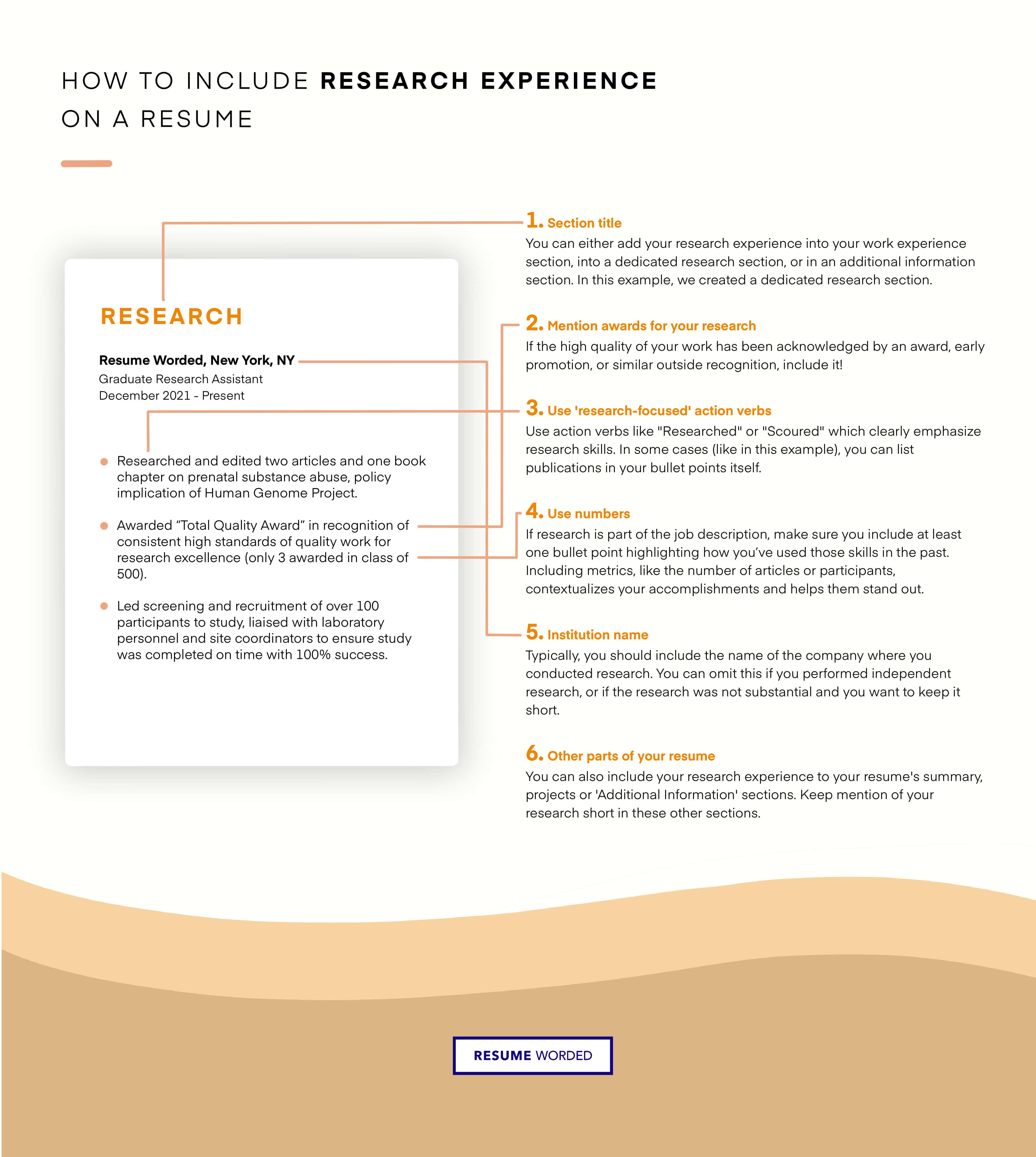
If you come from a research background, you might want to title your work experience ‘Research.’ Alternatively, you could create two experience sections — one titled ‘Work Experience’ and one titled ‘Research Experience’ — if you also have a lot of non-research experience but want to highlight your most relevant experience first. You can go into more detail when applying for a research-focused role by describing the project and specifying the nature of the research and your role in it.
More information: How to title different sections of your resume
Including research experience in your main work experience section is appropriate if it was paid work or if it was your most recent and relevant experience. List the employer — for example, the university or research department — job title, dates, and accomplishments, just like you would any other work experience.
More information: How to list your work experience on your resume
If you’re a current student or recent graduate, you can list your education section at the top of your resume. You can also make this section a little more comprehensive if you don’t have a lot of work experience, by including things like awards, coursework, and academic research.
If you undertook research as part of your studies and it demonstrates skills relevant to the job you’re applying for, list your research accomplishments in bullet points under the education section of your resume.
More information: The must-haves when writing your education on your resume
If you have a lot of publications that came out of your research, and you want to draw attention to them — and if they’re relevant to the job you’re applying for — consider creating a separate publications section . Formal publications like these are an excellent way to add credibility to your research experience.
List each publication in a new bullet point with the title, year, and name of the magazine, website, or journal. Academic publications can be listed more formally if it’s relevant, like if you’re applying for graduate school or a role in academia.
When it comes to listing research on your resume, like other soft skills, you need to show you’ve used this skill in your previous roles by showcasing your research related accomplishments. Upload your resume to the tool below to find out if your resume highlights your most relevant research experience and achievements.
If your research experience is less extensive or wasn’t quite relevant enough to include alongside your work experience or education, you can still highlight it in a projects section. Keep this brief and include 1-2 bullet points showcasing your key research accomplishments.
More information: How to list projects on a resume
Research skills can go in your skills section — as long as they’re hard skills. Steer clear of listing generic skills like “Research” — instead, use our keyword finder to look for relevant skills and keywords and include specific hard skills like data analysis, project management, software proficiency, and certifications.
You can also use the skills search tool below to get a list of hard skills relevant to the research-focused role you’re applying for.
More information: How to write a resume skills section
If you’re applying for a position where research experience is essential, consider emphasizing your experience by including a short resume summary at the top of your resume. This should include the title of the job you’re applying for and a brief overview of your background and key skills.
More information: Generate a summary for your resume
Examples of listing research experience on your resume
No matter where you choose to include it, always list research experience in concise, accomplishment-focused bullet points . These should follow the structure of action verb + what you did + what the result was. Here are some examples of resume bullet points you can use or modify to suit your own research experiences.
Highlight research projects
- Assisted with cell development research projects as part of the Leukemia Research team — identifying cell changes, determining cell counts and coulter counters with 98% accuracy.
If you have significant research experience, describe it! The more relevant it is to the position you’re applying for, the more detail you can go into. Make sure to specify exactly what stages of research you worked on and what your contribution was.
Mention awards for your research
- Awarded “Total Quality Award” in recognition of consistent high standards of quality work for research excellence (only 3 awarded in class of 500).
If the high quality of your work has been acknowledged by an award, early promotion , or similar outside recognition, include it! In addition to the name of the award or accolade, don’t forget to specify context (e.g. 'out of class of 500 people' to increase its credibility.
Demonstrate technical expertise
- Created over 75 3D models with CAD tools such as Solidworks and ANSYS.
If you have experience with specific software or tools that you’ll be using in the position you’re applying for, include a bullet point accomplishment specifying how you’ve used them. While this isn't direct 'research' experience, it uses tools that are relevant to research projects — this is a good way of showing that you have research skill sets without having formal research experience.
Use 'research-focused' action verbs
- Researched and edited two articles and one book chapter on prenatal substance abuse, policy implication of Human Genome Project.
Use action verbs like "Researched" or "Scoured" which clearly emphasize research skills. In some cases (like in this example), you can list publications in your bullet points itself. If you’ve authored academic papers, books, or articles, this is a great way to show the validity and importance of your research.
Include accomplishments related to research studies
- Oversaw screening and recruitment of over 100 participants to study, liaised with laboratory personnel and site coordinators to ensure study is completed on time with 100% success.
Not all research positions involve pure research. Make sure you highlight appropriate related accomplishments, like managing research study participant data and enrolments or managing a team of research assistants.
Include accomplishments relating to research in your field
- Conducted legal research; organized and analyzed data and evidence for over 50 cases annually.
If research is part of the job description, make sure you include at least one bullet point highlighting how you’ve used those skills in the past. Including metrics, like the number of cases you’ve researched, contextualizes your accomplishments and helps them stand out.
- Conducted marketing research for both buy-side and sell-side resulting in 15 strong leads.
Research isn’t just limited to science and academia. Demonstrate your skills in action by the context and end results of your research, like the number of leads it generated or the increase in sales figures.
Spread the word
Hiring manager’s guide: how to list work experience on your resume, you lied on your resume and got the job. what now, keep reading, how to show bilingualism on your resume (with examples), oops what to do if there’s a mistake on your resume, getting the basics right: resume line spacing, subscribe to our newsletter.
Stay updated with Resume Worded by signing up for our newsletter.
🎉 Awesome! Now check your inbox and click the link to confirm your subscription.
Please enter a valid email address
Oops! There was an error sending the email, please try later

Thank you for the checklist! I realized I was making so many mistakes on my resume that I've now fixed. I'm much more confident in my resume now.

- • Directed a multi-sector research project evaluating the impact of digital resources in academic environments, benefiting over 30 institutions.
- • Implemented innovative qualitative research methods that increased project efficiency by 25%.
- • Authored impactful research reports presented at national conferences, influencing educational policy directions.
- • Supervised and mentored a team of 3 junior analysts, improving team productivity and research output quality.
- • Managed project timelines and deliverables for complex studies, resulting in 95% on-time completion rate.
- • Developed strong professional relationships with stakeholders and collaborators, which led to securing 2 significant research grants.
- • Conducted in-depth analysis on STEM education trends, influencing curriculum development for 100+ educational institutions.
- • Played a critical role in a team that delivered 4 major research projects yearly, exceeding stakeholder expectations.
- • Managed cross-functional teams, increasing overall project efficiency by 15%.
- • Presented research findings at 10+ industry conferences, enhancing the company's professional reputation.
- • Leveraged advanced data collection tools to gather and analyze information from over 500 interview subjects.
- • Assisted in the preparation of grant proposals that secured funding of over $500,000 for environmental research.
- • Organized and managed data collection for a large-scale research study on conservation best practices.
- • Played a key role in publishing 3 research papers that contributed to new sustainability guidelines.
- • Supported senior researchers in conducting fieldwork and data analysis for interdisciplinary research projects.
13 Researcher Resume Examples & Guide for 2024
Your researcher resume must demonstrate your expertise in your field. Clearly highlight publications, presentations, or projects you've contributed to. Showcase your analytical and data collection skills. Elaborate on the methodologies you're proficient with to prove your technical capabilities.
All resume examples in this guide
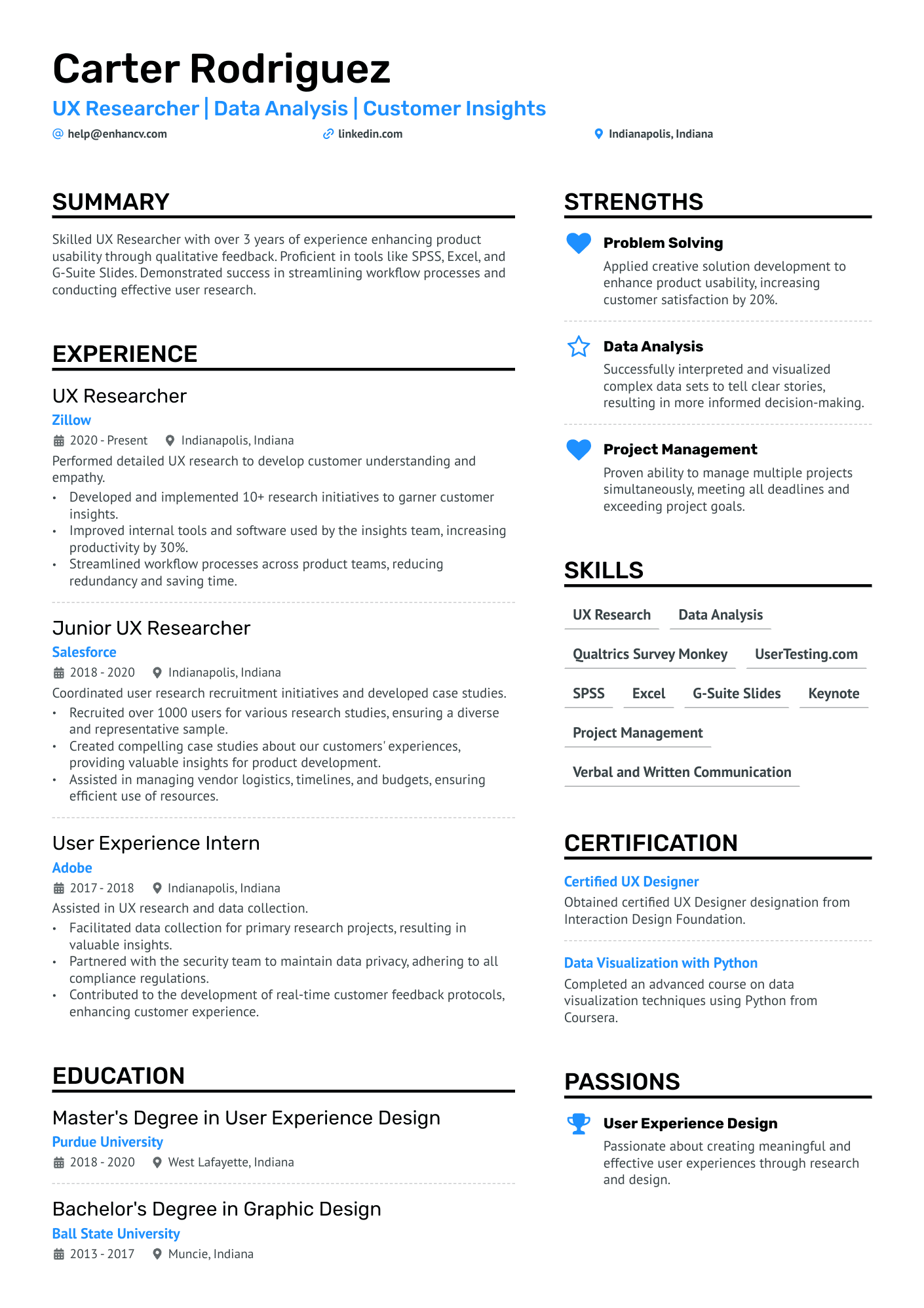
UX Researcher
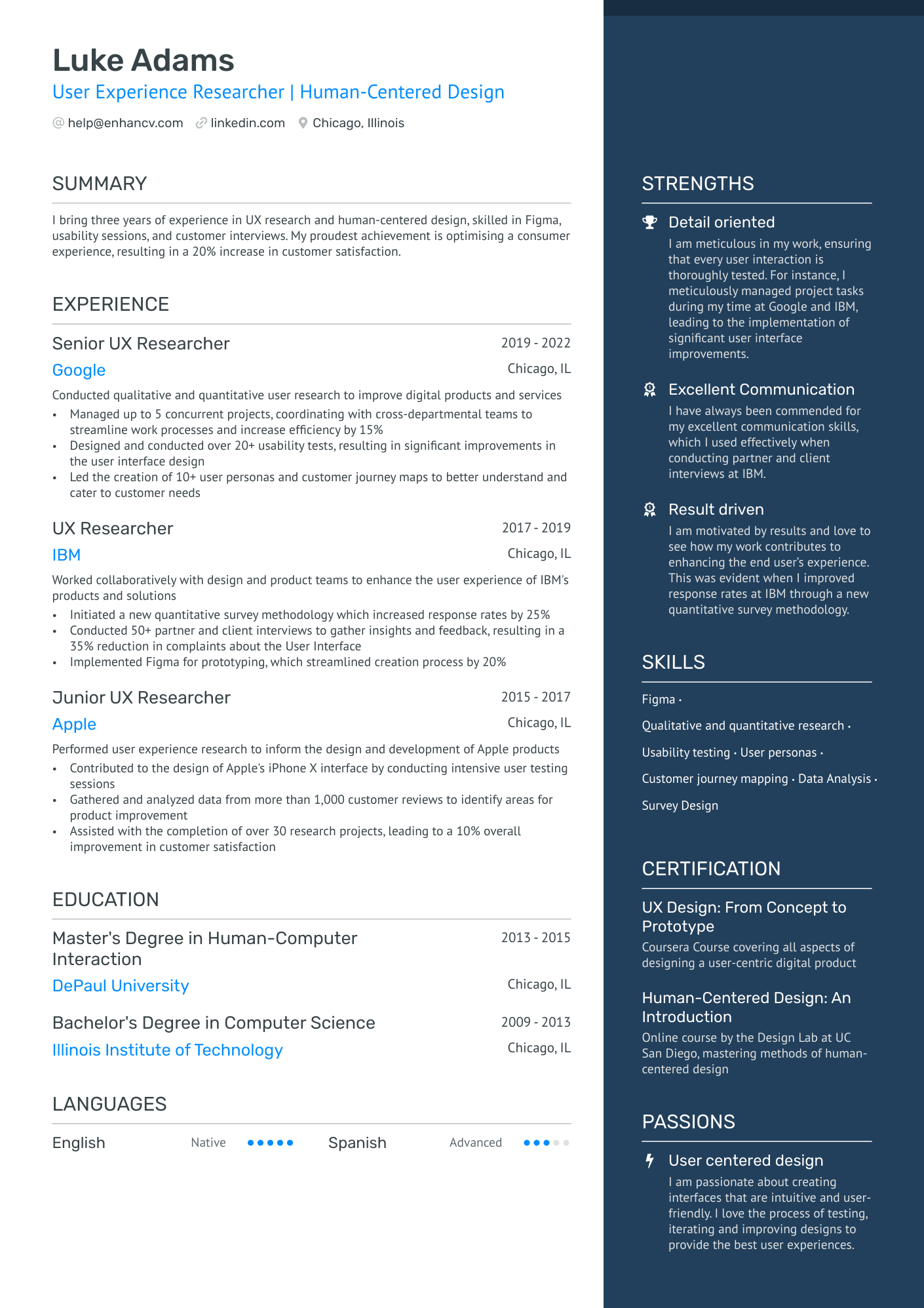
User Researcher
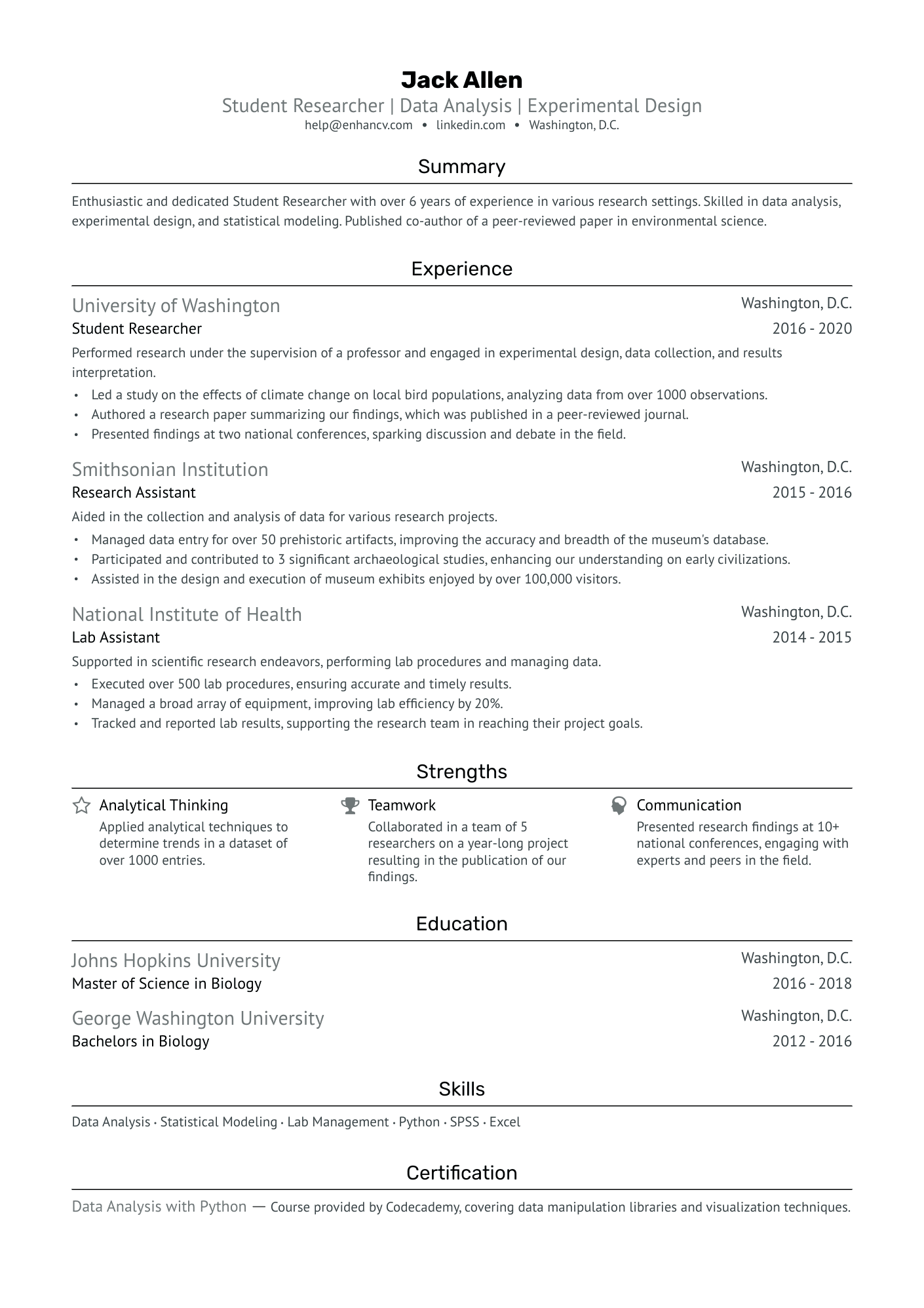
Student Researcher
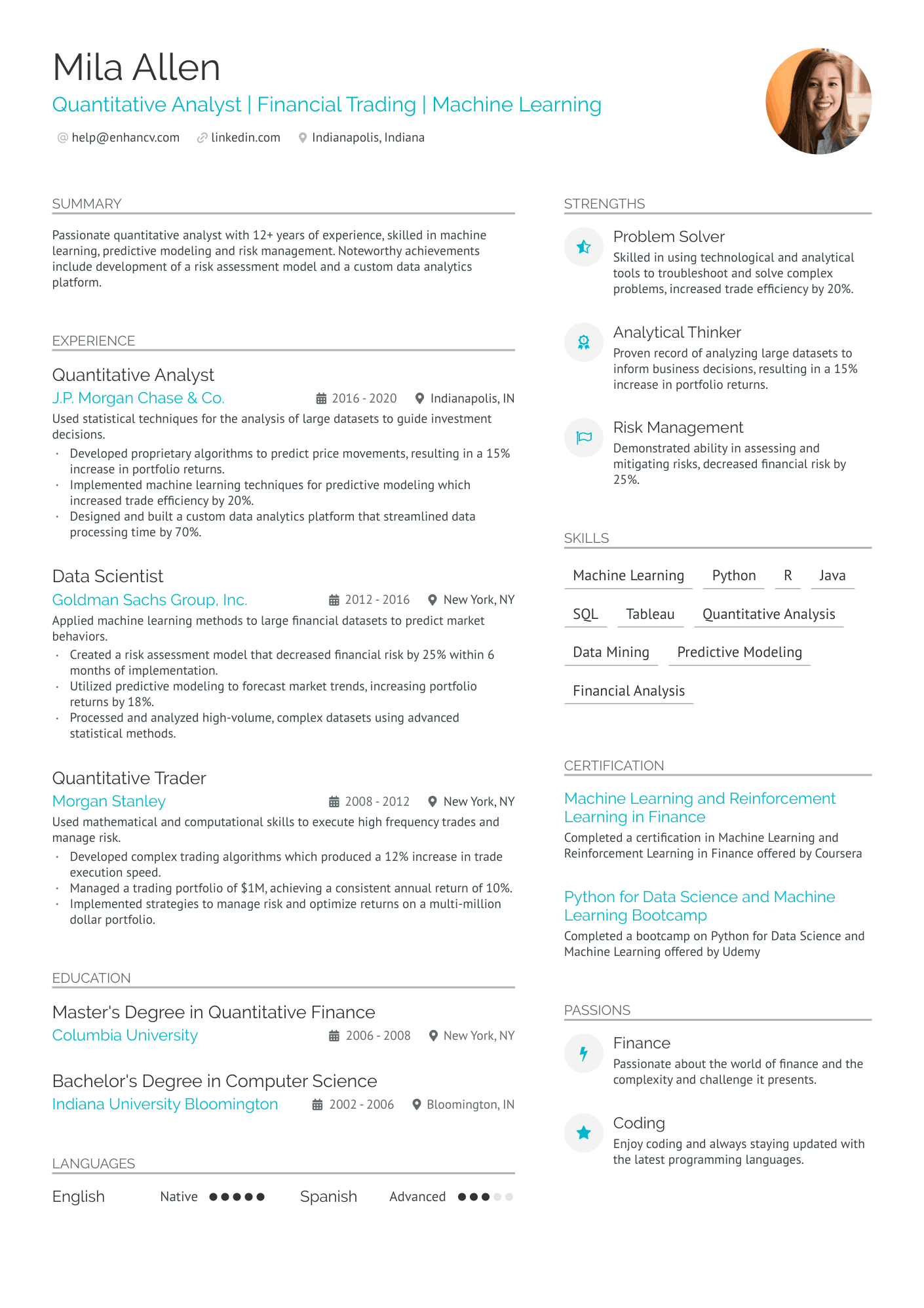
Quantitative Researcher
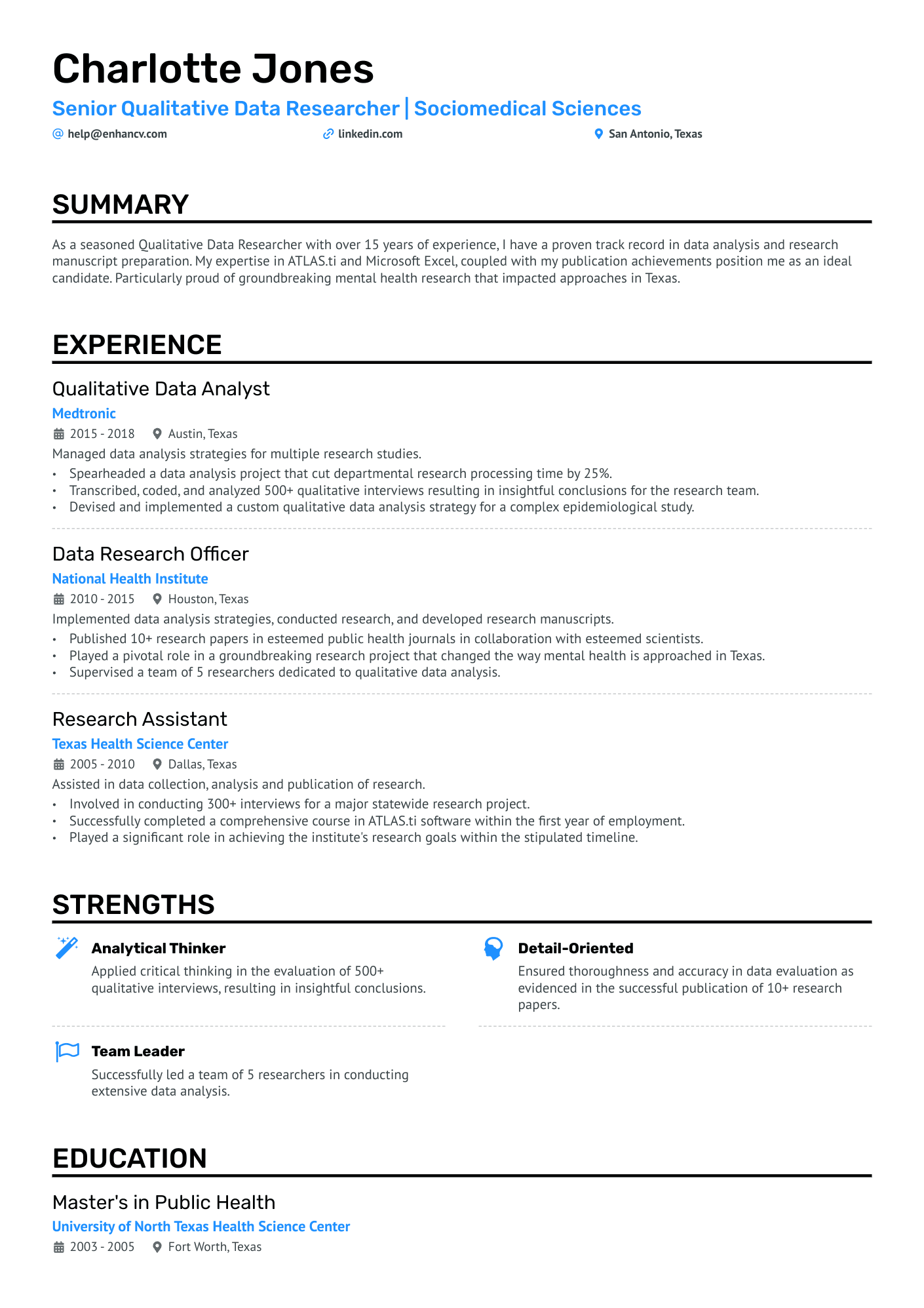
Qualitative Researcher
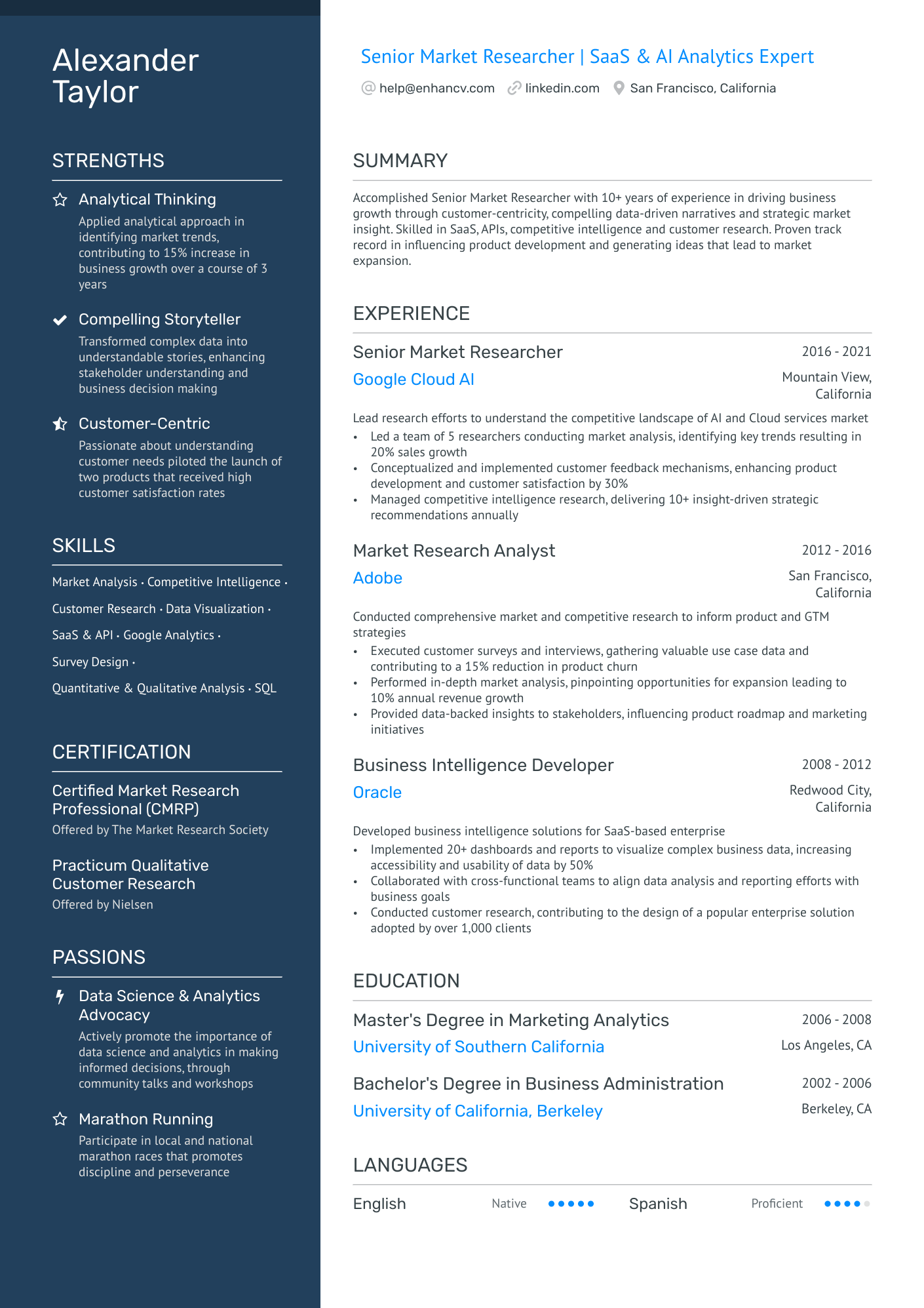
Market Researcher
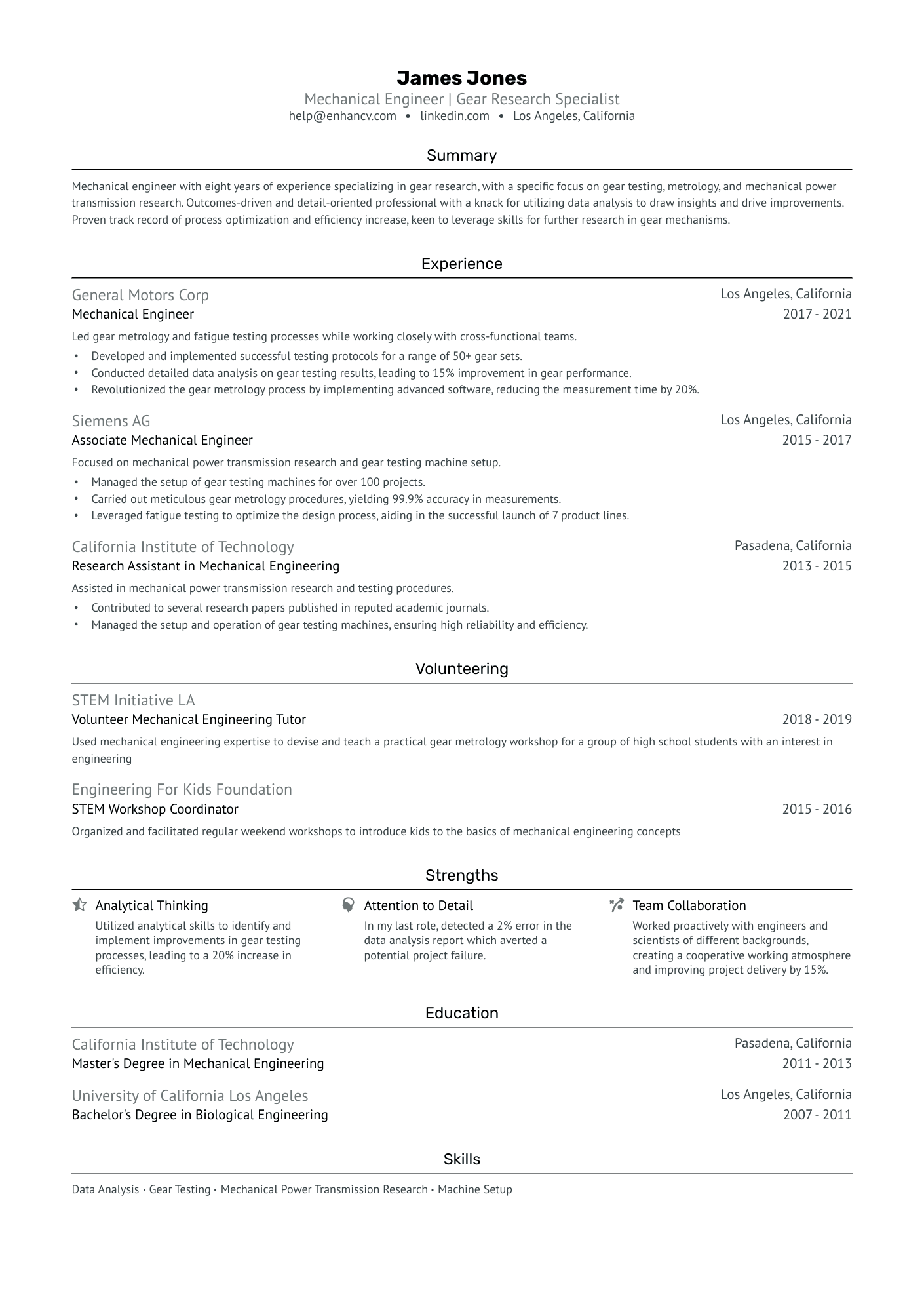
Undergraduate Researcher
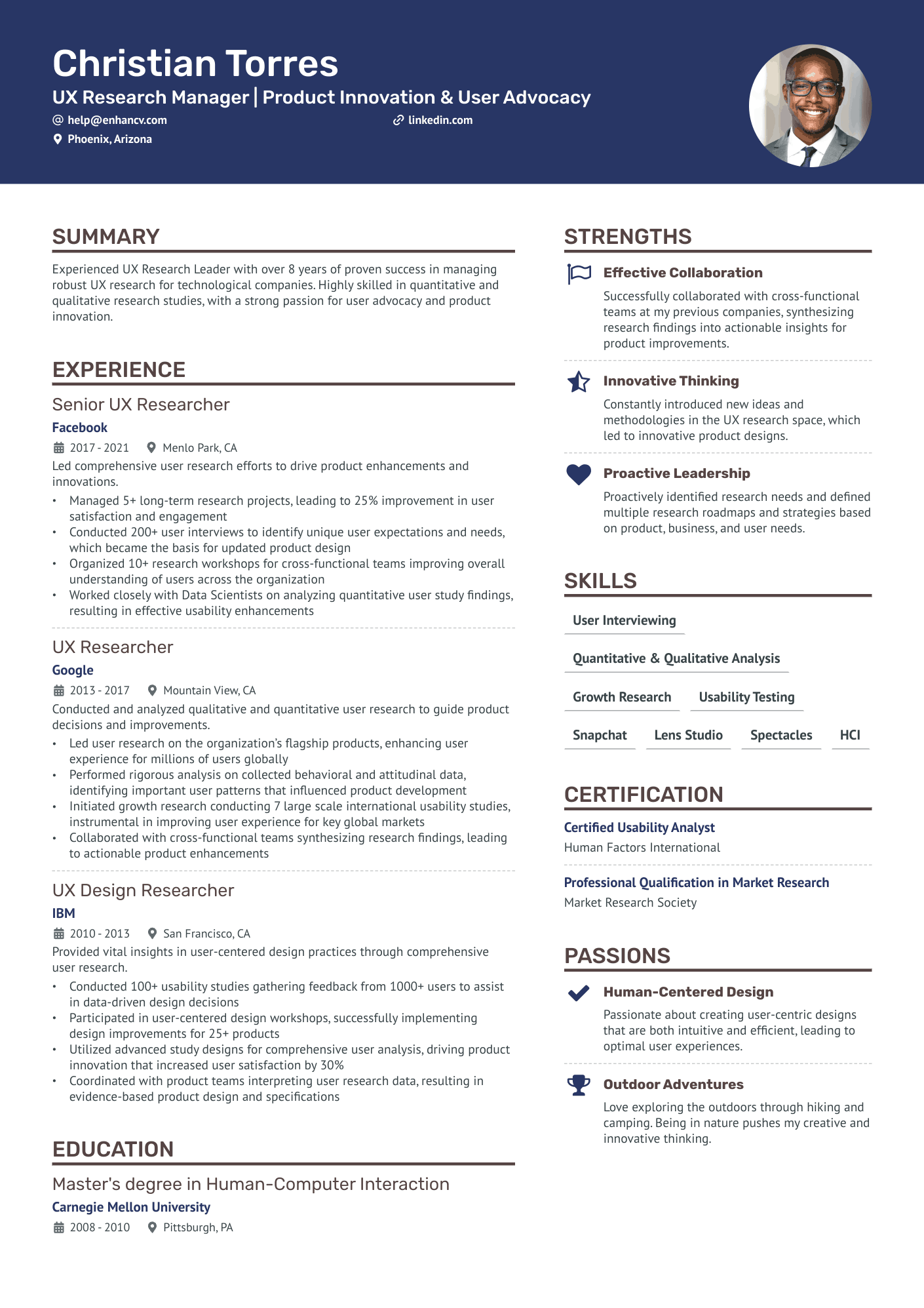
Product Researcher
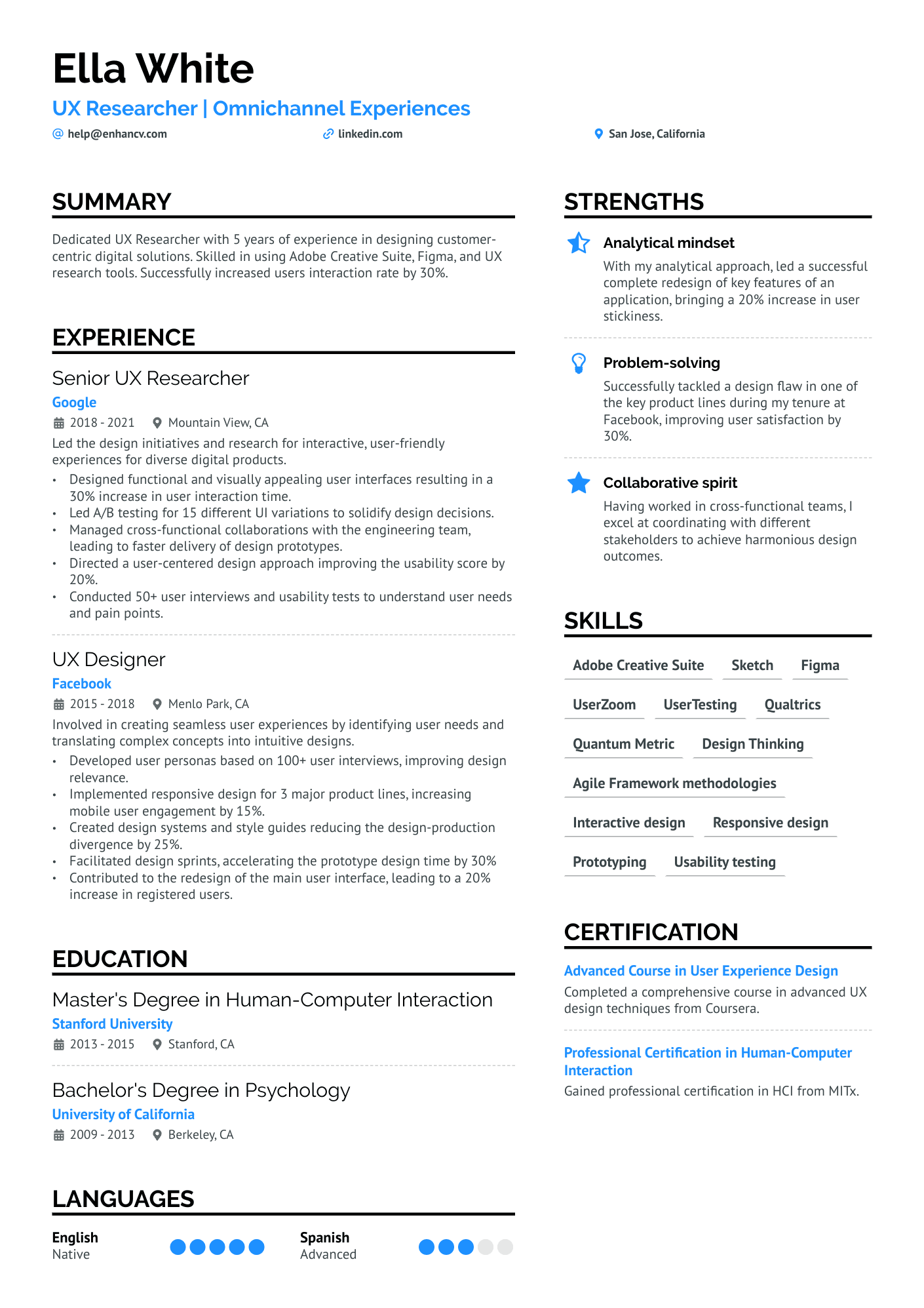
Psychology Researcher
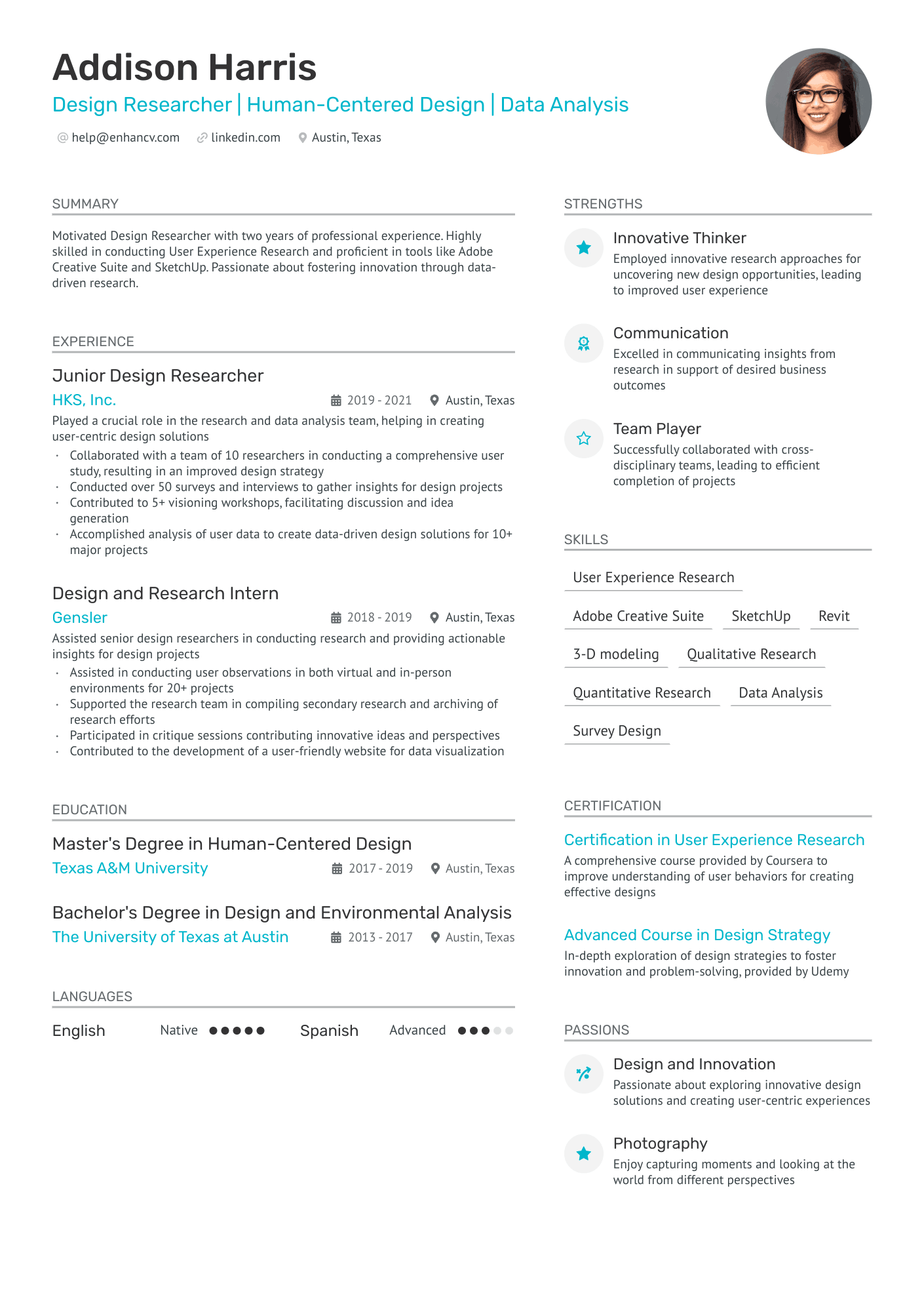
Design Researcher
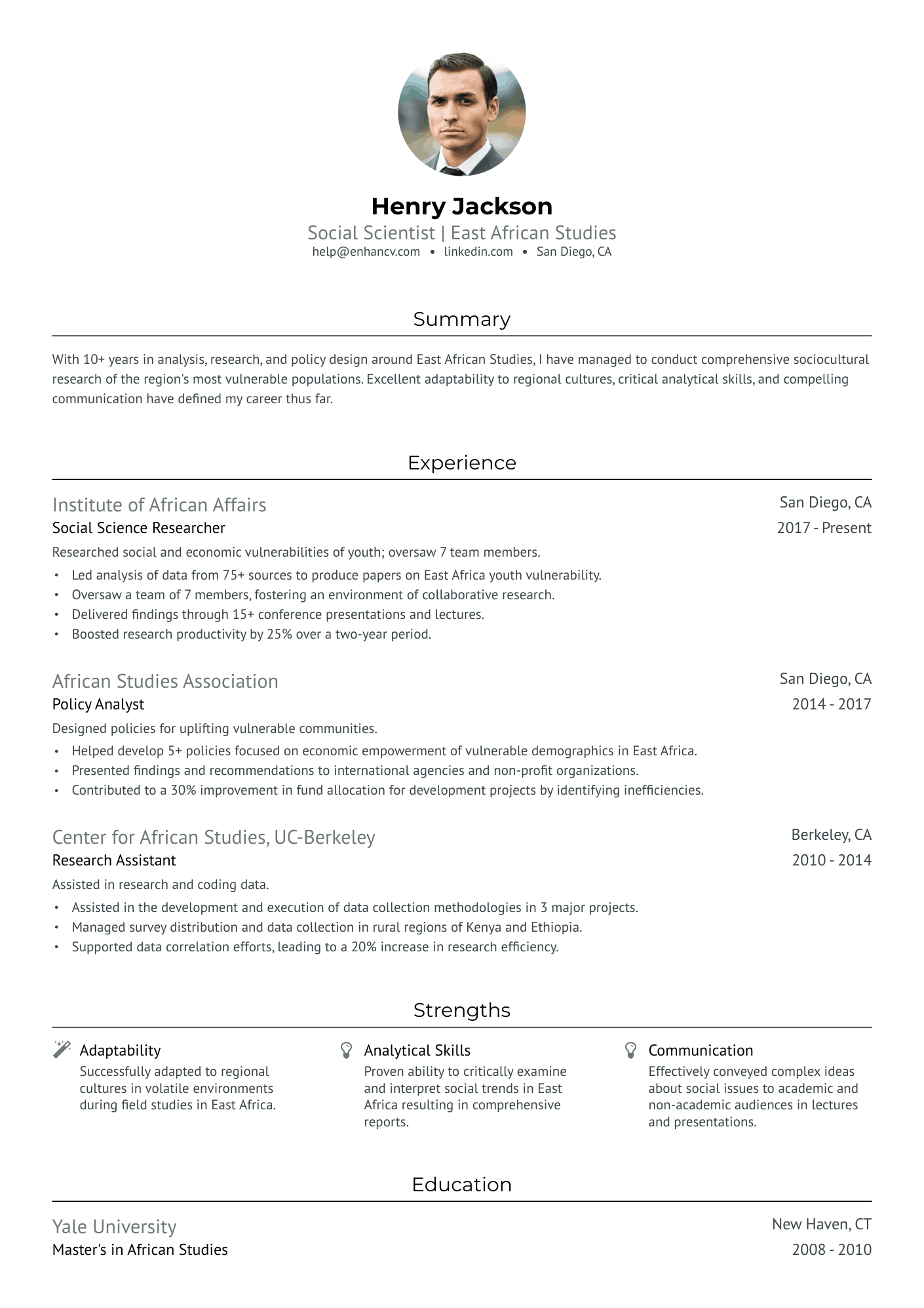
Lab Researcher
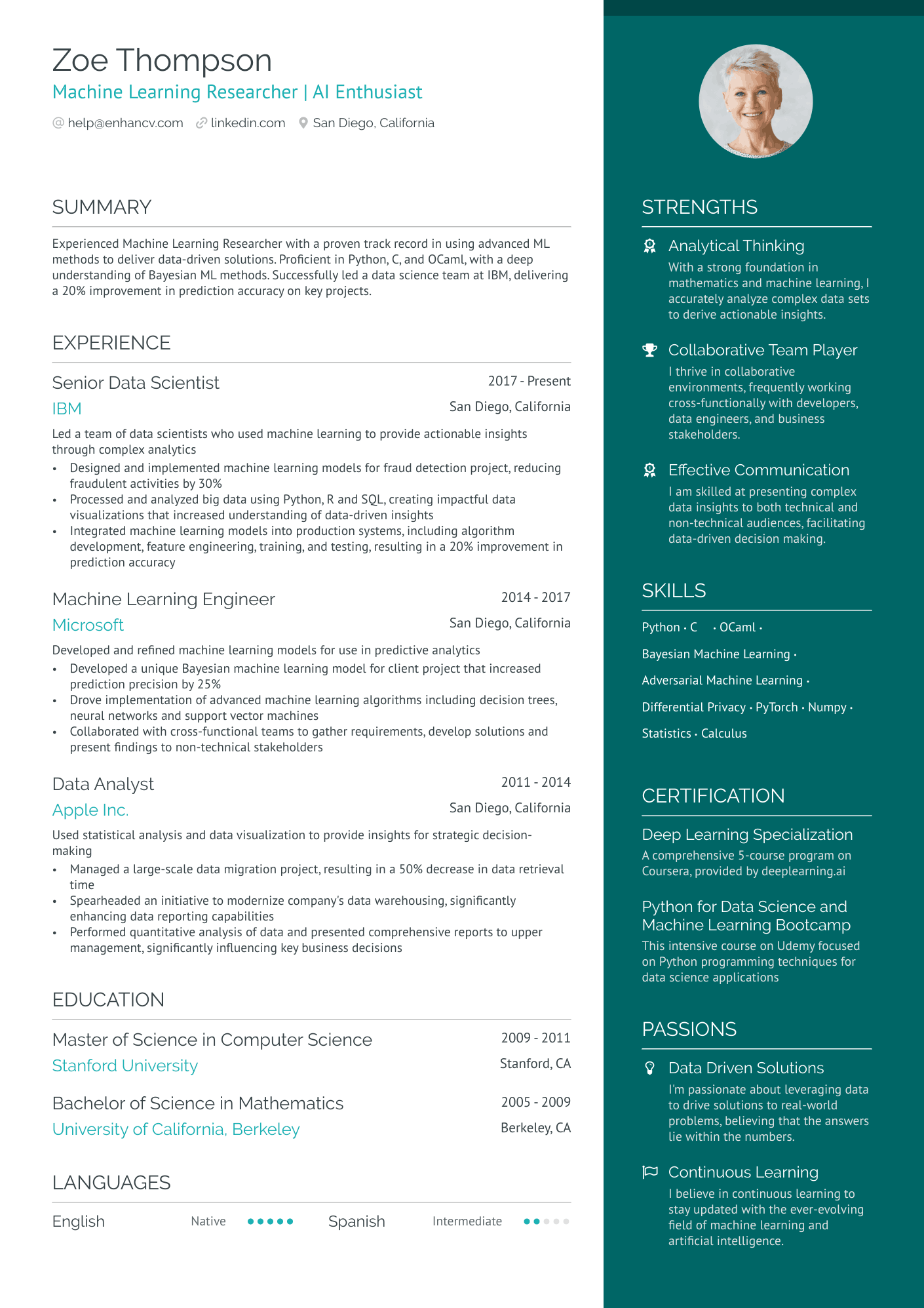
Machine Learning Researcher
Resume guide.
Resume Format Tips
Resume Experience
Skills on Resume
Education & Certifications
Resume Summary Tips
Additional Resume Sections
Key Takeaways

As a researcher, you may struggle with translating your extensive project experience into a concise format that appeals to a broad range of employers. Our guide will provide you with tailored strategies to effectively distill your research accomplishments into an impactful resume that resonates across industries.
- Utilize real-life examples to refine your researcher resume;
- Effectively write the experience section of your researcher resume, even if you have minimal or no professional experience;
- Incorporate the industry's top 10 essential skills throughout your resume;
- Include your education and certifications to highlight your specific expertise.
If the researcher resume isn't the right one for you, take a look at other related guides we have:
- Lab Manager Resume Example
- Lab Technician Resume Example
- Scientist Resume Example
- Chemist Resume Example
- Research Assistant Resume Example
- Lab Assistant Resume Example
- Research Director Resume Example
- Radiologic Technologist Resume Example
- Research Manager Resume Example
- Research Associate Resume Example
Simple guide to your researcher resume format and layout
- professional experience - use the reverse-chronological resume format;
- skills and achievements - via the functional skill-based resume format;
- both experience and skills - with a hybrid resume format .
What is more, keep in mind that your resume may be initially assessed by the ATS (Applicant Tracker System) (or the software used by companies in the hiring process). The researcher resumes that suit the ATS:
- have a header that includes either a role keyword or the job you're applying for;
- should be no longer than two pages;
- be submitted as PDF, unless specified otherwise.
Upload & Check Your Resume
Drop your resume here or choose a file . PDF & DOCX only. Max 2MB file size.
If you happen to have some basic certificates, don't invest too much of your researcher resume real estate in them. Instead, list them within the skills section or as part of your relevant experience. This way you'd ensure you meet all job requirements while dedicating your certificates to only the most in-demand certification across the industry.
The five (plus) definite sections your resume for a researcher job should include are:
- Header with your headline, contact details, and/or a preview of your work
- Summary (or objective) to pinpoint how your success aligns with the role
- Experience with bullets of your most relevant achievements in the field
- Skills to integrate vital job requirements (both technical and personal)
- Your further dedication to the field, showcased via relevant higher education and/or certifications
What recruiters want to see on your resume:
- Publishing Record: Evidence of publications in reputable journals or conferences relevant to the field.
- Research Experience: Detailed description of past research projects, roles, and contributions.
- Grant Writing Skills: Demonstrated success in securing research funding from grants, fellowships, or scholarships.
- Technical Expertise: Proficiency with tools and methodologies specific to the research area, like statistical analysis software, lab techniques, or data analysis programs.
- Collaboration and Communication: Examples of working effectively within interdisciplinary research teams and communicating complex research findings to diverse audiences.
Creating your researcher resume experience to catch recruiters' attention
Remember that for the researcher role, hiring managers are looking to see how your expertise aligns with their requirements. Here's where your resume experience section can help out. Make sure you:
- Include mainly roles that are relevant to the researcher job you're applying for;
- Don't go too far back in your experience - recruiters will only care what you did a decade ago if it's really important for the researcher role;
- Each bullet you include should say what you did, followed by the skills you used and the actual end result of your efforts;
- Quantify each of your achievements with numbers and possibly the overall effect it had on the organization;
- Highlight transferrable skills - or personal skills you've attained thanks to past jobs - that could be applicable within your potential workplace. This would showcase your unique value as a professional.
Formatting the experience section of your resume doesn't have to be an over-the-top deep dive into your whole career. Follow the researcher resume examples below to see how industry-leading professionals are presenting their experience:
- Designed and executed a comprehensive experimental study on the effects of new agricultural chemicals, increasing crop yields by 20% over a two-year period.
- Authored and co-authored 6 peer-reviewed journal articles in the field of synthetic biology, enhancing the company's academic presence and fostering collaborative opportunities.
- Mentored a team of junior researchers and interns, improving team productivity by 30% and helping to establish a robust research pipeline.
- Implemented new data collection protocols for patient trials, which improved data accuracy by 25% and ensured regulatory compliance.
- Coordinated with cross-functional teams to manage over 15 multi-center clinical trials, ensuring that deadlines were met and budgets were maintained.
- Presented findings at 3 international conferences, significantly raising the profile of the research programs and attracting future funding.
- Led the research and prototype development for a new medical device, which subsequently received FDA approval and led to a 150% increase in departmental revenue.
- Coordinated with a team of scientists to integrate artificial intelligence in the device's diagnostic process, improving prediction accuracy by 35%.
- Managed the intellectual property process for developed technologies, resulting in the granting of 5 patents and protecting the company's assets.
- Analyzed consumer behavior data and trends to inform the company's marketing strategies, contributing to a 40% increase in market share.
- Developed and administered over 200 surveys and focus groups to gather actionable customer insights, directly influencing product development.
- Worked directly with the sales team to refine target demographics, which led to more effective ad spend and a 25% increase in conversion rates.
- Directed a groundbreaking research initiative on renewable energy that secured $2M in grants from government and private sectors.
- Managed collaborations with industry partners to test and refine prototype solar panels, achieving a 50% increase in efficiency over existing models.
- Organized and chaired a successful international symposium on sustainable energy, fostering partnerships that led to further R&D investments.
- Led the development of a novel gene-editing platform, which resulted in a 200% increase in experiment throughput and reduced costs by 40%.
- Collaborated with pharmaceutical companies to leverage the platform for drug development, accelerating the timeline from discovery to preclinical trials.
- Managed the submission of regulatory documents for new research protocols, ensuring full compliance with all federal and state regulations.
- Processed and analyzed big data sets using advanced analytics tools, uncovering patterns that led to a 20% improvement in operational efficiency.
- Developed custom scripts and algorithms to automate data collection processes, saving the company an average of 250 man-hours per month.
- Designed an interactive dashboard that provided real-time insights into market trends, which became a key decision-making tool for the executive team.
- Monitored patient enrollment and data integrity for over 10 international clinical trials, ensuring adherence to study protocols and Good Clinical Practice guidelines.
- Provided key contributions to the successful launch of a Phase III trial, which saw a 95% retention rate of study participants due to enhanced engagement strategies.
- Developed training materials and conducted workshops for new clinical research coordinators, greatly improving the effectiveness and compliance of the research team.
Quantifying impact on your resume
- Include the number of publications you've authored to demonstrate the depth and breadth of your research experience.
- List the amount of research funds you've secured, as it shows your capability to attract significant financial resources for your work.
- State the number of experiments or studies you've conducted to quantify your hands-on experience in your field.
- Mention the number of citations your work has received to reflect its influence and acceptance in the research community.
- Highlight the size of the research teams you've led or participated in to show your collaborative and leadership skills.
- Detail the number of conferences you've presented at to exhibit your ability to communicate your findings to a professional audience.
- Provide the percentage by which your findings have improved a process or technique within your field to illustrate the practical impact of your research.
- Specify the number of patents you hold, if applicable, to demonstrate innovation and potential for commercial application of your work.
Action verbs for your researcher resume

Four quick steps for candidates with no resume experience
Those with less or no relevant experience could also make a good impression on recruiters by:
- Taking the time to actually understand what matters most to the role and featuring this within key sections of their resume
- Investing resume space into defining what makes them a valuable candidate with transferrable skills and personality
- Using the resume objective to showcase their personal vision for growth within the company
- Heavily featuring their technical alignment with relevant certifications, education, and skills.
Remember that your resume is about aligning your profile to that of the ideal candidate.
The more prominently you can demonstrate how you answer job requirements, the more likely you'd be called in for an interview.
Recommended reads:
- How To Include Your Relevant Coursework On A Resume
- How to List Continuing Education on Your Resume
The more trusted the organization you've attained your certificate (or degree) from, the more credible your skill set would be.
Balancing hard and soft skills in your researcher resume
Recruiters indeed pay close attention to the specific hard and soft skills candidates possess. Hard skills refer to technical abilities or your proficiency in technologies, while soft skills are the personal attributes and qualities developed over your lifetime.
If you're unsure about effectively quantifying these skills on your resume, follow our step-by-step guide. It's crucial to first understand the key job requirements for the role. Doing so enables you to accurately list your:
- Hard skills in sections like skills, education, and certifications. Your technical expertise is straightforward to quantify. Most organizations find it sufficient to mention the certificates you've earned, along with your proficiency level.
- Soft skills within your experience, achievements, strengths, etc. Defining interpersonal communication traits in your resume can be challenging. Focus on showcasing the accomplishments you've achieved through these skills.
Remember, when tailoring your researcher resume, ensure that the skills you list match exactly with those in the job requirements. For instance, if the job listing specifies "Microsoft Word," include this exact term rather than just "Word" or "MSO."
Top skills for your researcher resume:
Data Analysis
Statistical Analysis
Qualitative Research
Quantitative Research
Research Design
Literature Review
Data Collection
Data Interpretation
Academic Writing
Scientific Publication
Critical Thinking
Problem Solving
Attention to Detail
Time Management
Communication
Adaptability
Project Management
Ethical Judgment
List your educational qualifications and certifications in reverse chronological order.
The importance of your certifications and education on your researcher resume
Pay attention to the resume education section . It can offer clues about your skills and experiences that align with the job.
- List only tertiary education details, including the institution and dates.
- Mention your expected graduation date if you're currently studying.
- Exclude degrees unrelated to the job or field.
- Describe your education if it allows you to highlight your achievements further.
Your professional qualifications: certificates and education play a crucial role in your researcher application. They showcase your dedication to gaining the best expertise and know-how in the field. Include any diplomas and certificates that are:
- Listed within the job requirements or could make your application stand out
- Niche to your industry and require plenty of effort to obtain
- Helping you prepare for professional growth with forward-facing know-how
- Relevant to the researcher job - make sure to include the name of the certificate, institution you've obtained it at, and dates
Both your certificates and education section need to add further value to your application. That's why we've dedicated this next list just for you - check out some of the most popular researcher certificates to include on your resume:
The top 5 certifications for your researcher resume:
- Project Management Professional (PMP) - Project Management Institute
- Certified Research Administrator (CRA) - Research Administrators Certification Council
- Institutional Review Board Professional (CIP) - Public Responsibility in Medicine and Research
- Certified Clinical Research Professional (CCRP) - Society of Clinical Research Associates
- Data Analysis & Statistics Certificate (DASC) - Various Institutions
Highlight any significant extracurricular activities that demonstrate valuable skills or leadership.
- When Should You Include Your High School on Your Resume?
- How To List Certifications On A Resume (Examples Included)
Researcher resume summary or objective? The best choice is based on your experience
If you're wondering about the relevancy of the resume summary or the resume objective to your Researcher application - here's the truth.
The summary and objective provide recruiters with your expertise and accomplishments at a glance, within an up-to-five-sentence structure.
The difference is that the:
- Resume objective is also more focused on emphasizing your career goals. The objective is the perfect fit for (potentially more junior) candidates who'd like to balance their relevant experience with their career goals.
- Resume summary can provide you with space to also detail the unique value of what it's like to work with you. Researcher candidates who have many noteworthy accomplishments start from the get-go with their summary.
Ensure that either type of resume introduction presents your Researcher expertise in the best light and aligns it with the job advert.
The more details you can provide with numbers, the more compelling your resume summary or objective will be.
Real-world Researcher candidates follow these frameworks in writing their resume summaries and objectives.
The end results are usually as such:
Resume summaries for a researcher job
- With a decade of profound experience in molecular biology, an extensive publication record, and a Ph.D. from MIT, the candidate is adept in genomics, proteomics, and bioinformatics. Awarded with the Young Scientist Award, they have led teams in groundbreaking cancer research, yielding patents and significant advancements in targeted therapy.
- A seasoned chemist with 15 years at GlaxoSmithKline specializing in pharmaceutical development, pivoting into biotechnology research with a strong desire to apply synthetic chemistry skills towards developing novel biologics. Recognized for innovation in small molecule synthesis, keen to contribute to interdisciplinary approaches in disease treatment.
- Former aerospace engineer with 12 years' tenure at NASA seeking to transition into climate research. Armed with robust analytical skills, a deep understanding of complex systems, and a master’s degree in environmental engineering, aiming to utilize simulation modeling to address pressing environmental challenges and climate change.
- After years of developing market forecasts and data models for economic research at a leading think tank, the candidate is eager to transfer their refined quantitative analysis skills into computational neuroscience research. With a strong grasp of machine learning and predictive analytics, they are ready to contribute to elucidating neural network functionalities.
- Graduating magna cum laude with a B.S. in biology, the applicant is enthusiastic about beginning a research career in immunology. Committed to lifelong learning and making impactful contributions, they are determined to leverage their strong foundation in cell biology and genetics to aid in developing innovative immunotherapies.
- As an ambitious recent graduate with a Master's in Computer Science and a passion for algorithm design, I am eager to delve into the world of bioinformatics research. With a zest for problem-solving and a commitment to advancing healthcare through technology, I aim to contribute to projects focused on genetic data analysis and personalized medicine.
Showcasing your personality with these four researcher resume sections
Enhance your researcher expertise with additional resume sections that spotlight both your professional skills and personal traits. Choose options that not only present you in a professional light but also reveal why colleagues enjoy working with you:
- My time - a pie chart infographic detailing your daily personal and professional priorities, showcasing a blend of hard and soft skills;
- Hobbies and interests - share your engagement in sports, fandoms, or other interests, whether in your local community or during personal time;
- Quotes - what motivates and inspires you as a professional;
- Books - indicating your reading and comprehension skills, a definite plus for employers, particularly when your reading interests align with your professional field.
Key takeaways
At the end of our guide, we'd like to remind you to:
- Invest in a simple, modern resume design that is ATS friendly and keeps your experience organized and legible;
- Avoid just listing your responsibilities in your experience section, but rather focus on quantifiable achievements;
- Always select resume sections that are relevant to the role and can answer job requirements. Sometimes your volunteering experience could bring more value than irrelevant work experience;
- Balance your technical background with your personality traits across various sections of your resume to hint at how much time employers would have to invest in training you and if your profile would be a good cultural fit to the organization;
- Include your academic background (in the form of your relevant higher education degrees and certifications) to show recruiters that you have the technical basics of the industry covered.
Researcher resume examples
Explore additional researcher resume samples and guides and see what works for your level of experience or role.

Looking to build your own Researcher resume?

- Resume Examples
500 Irish Created A Resume For Saint Patrick. Here It Is!
The best jobs in the metaverse, should you include citizenship on your resume, when you should (and not) add dean's list on your resume, targeted resume: 3-step process to win any recruiter over, how to ace 'tell me about a time you failed' job interview question.
- Create Resume
- Terms of Service
- Privacy Policy
- Cookie Preferences
- Resume Templates
- AI Resume Builder
- Resume Summary Generator
- Resume Formats
- Resume Checker
- Resume Skills
- How to Write a Resume
- Modern Resume Templates
- Simple Resume Templates
- Cover Letter Builder
- Cover Letter Examples
- Cover Letter Templates
- Cover Letter Formats
- How to Write a Cover Letter
- Resume Guides
- Cover Letter Guides
- Job Interview Guides
- Job Interview Questions
- Career Resources
- Meet our customers
- Career resources
- English (UK)
- French (FR)
- German (DE)
- Spanish (ES)
- Swedish (SE)
© 2024 . All rights reserved.
Made with love by people who care.
- Knowledge Base
- Free Resume Templates
- Resume Builder
- Resume Examples
- Free Resume Review
Should I include research experience on my resume?
If this is you debating whether or not you should include your research experience on your resume, you’ve come to the right place.
When it comes to landing your dream job, having relevant experience on your resume can make all the difference.
This is especially true in the field of research, where employers are often looking for candidates with strong skills and experience.
In fact, surveys show that 65% of recruiters prefer their candidates to have relevant work experience. when evaluating job candidates.
So if you are seeking jobs related to research, it is indeed crucial to showcase your research experience on your resume in a way that can help you stand out from other candidates and increase your chances of landing an interview.
In this article, we'll discuss the key strategies for highlighting your research experience on your resume, including the types of information to include, how to structure your resume, and other tips for effectively showcasing your skills and experience.
- What is research experience on a resume and why is research experience important?
- How to put research experience on a resume?
- Where to put research experience on a resume?
- What is an example of research experience?
What is Research Experience on Resume and Why is it Important?
Research experience refers to any experience you have had conducting research, whether as part of an academic course, an internship, or a job.
Depending on the industry, it could involve conducting literature reviews, collecting and analyzing data, performing experiments, and presenting research findings.
Research experience can be incredibly valuable in a variety of fields, including science, engineering, healthcare, education, and social sciences. It shows potential employers that you have the skills and expertise needed to work in a research-oriented role.
Including research experience on your resume can be highly advantageous. Here are some reasons why:
Demonstrates critical thinking and problem-solving skills: Research requires careful analysis and critical thinking, demonstrating your ability to approach complex problems and develop solutions.
Shows attention to detail: Conducting research often requires meticulous attention to detail and a focus on accuracy, qualities that are highly valued in many industries.
Highlights technical skills: Depending on the type of research you conducted, you may have developed technical skills, such as data analysis, statistical analysis, or programming.
Shows initiative and independence: Research often involves working independently and taking the initiative to design and execute research projects. This shows potential employers that you are self-motivated and can take the lead when necessary.
Also Read: How to write a research assistant resume in 2023?

How to Describe Research Experience on Resume?
To make the most of your research experience, it's important to know how to include it on your resume effectively. Here are some tips to help you get started:
Choose the Right Format
There are several different resume formats you can use, including chronological, functional, and combination formats.
When highlighting your research experience, the chronological format is typically the best choice. This format lists your research experience in reverse chronological order, starting with your most recent experience.
Tailor Your Resume to the Job Description
When crafting your resume, make sure to tailor your research experience to the job description you're applying for. This means highlighting the research experience that is most relevant to the position you're seeking.
For instance, if you're applying for a research position at a company, and the job description specifically mentions experience with qualitative research methods. You must highlight your experience with these research methods on your resume.
You can write, “Experienced in qualitative research methods, including in-depth interviews, focus groups, and content analysis.”
Use Action-Oriented Language
Ensure to use action-oriented language that emphasizes your accomplishments and responsibilities while describing your research experience on your resume.
This means you need to use strong verbs and quantify your achievements wherever possible. Here are a few examples:
- Instead of writing "Conducted research on topic X," write "Led a research project on topic X, resulting in a published paper in Journal Y."
- Rather than writing "Assisted with data analysis," write "Developed and implemented a data analysis plan that identified key trends and insights."
By using action-oriented language and emphasizing your specific accomplishments and skills, you can demonstrate to the employer that you're a proactive and results-driven candidate.
Thereby, helping you increase your chances of landing an interview and ultimately getting the job.
Highlight Your Technical Skills
If you developed technical skills through your research experience, make sure to highlight them on your resume.
This could include experience with statistical software, programming languages, or laboratory techniques.
Provide Specific Examples
Rather than blatantly listing your research experience on your resume, provide specific examples of your accomplishments and the results of your research.
This can help potential employers see the impact of your work and understand the skills you bring to the table better. It also adds credibility to your research skills and experiences.
Also Read: How to build a stellar academic resume?
Where to Put Research Experience on Resume?
When it comes to where to put research experience on your resume, there are a few options:
Under a "Research Experience" section: This is the most straightforward option and allows you to list your research experience and projects in a dedicated section. Be sure to include the project title, your role, the duration, and any relevant details such as methodology or results.
Under your "Experience" section: If your research experience is relevant to your previous jobs or internships, you can list it under the corresponding job entry. For example, if you conducted research as part of an internship or a job, you could include a bullet point under that entry that describes your research experience.
In a separate "Publications" or "Presentations" section: If you have published research papers or presented at conferences, you can include them in a separate section that highlights these accomplishments. Be sure to include the title of the paper or presentation, the conference or journal name, and the date.
Also Read: How to showcase work experience effectively in a resume in 2023?
Examples of Research Experience on Resumes
For your reference, given below are some examples of research experience on a resume:
- Conducted research on the effectiveness of a new cancer treatment, including developing research protocols, collecting and analyzing data, and presenting findings to a team of oncologists.
- Collaborated with a team of researchers to conduct a qualitative study on the experiences of women in STEM fields, including conducting interviews and focus groups, analyzing data using NVivo software, and presenting findings at a national conference.
- Completed an independent research project on the impact of social media on mental health, including conducting a literature review, designing and administering a survey, and analyzing data using SPSS software.
- Assisted a team of researchers in analyzing data from a large-scale epidemiological study, including cleaning and formatting data, running statistical analyses, and creating visualizations using R software.
- Participated in a summer research program, working with a mentor to conduct research on the impact of climate change on coastal ecosystems, including collecting and analyzing data, writing reports, and presenting findings at a research symposium.
- Conducted a research project as part of a senior thesis, exploring the relationship between exercise and cognitive function in older adults, including designing and implementing a study, collecting and analyzing data, and presenting findings at a departmental conference.
Also Read: What is the difference between a CV and a resume?
Key Takeaways
- What is research experience on a resume and why is it important?
Research experience encompasses conducting research in various settings, such as academic courses, internships, or jobs, which can provide critical thinking and problem-solving skills, attention to detail, technical skills, and show initiative and independence. By including research experience on a resume, potential employers can gain insight into the candidate's expertise, skills, and suitability for research-oriented roles, which can be beneficial in many industries.
- How to list research experience on a resume?
To highlight your research experience effectively, it is crucial to choose the right format, tailor your resume to the job description, use action-oriented language, highlight your technical skills, and provide specific examples of your accomplishments in your research.
There are 3 options when it comes to placing your research experience on your resume - a dedicated "Research Experience" section, your "Experience" section, or in a separate "Publications" or "Presentations" section. Wherever you decide to showcase them, ensure to include details like project title, duration, methodology, or results.
If you want to build a stellar resume that showcases your research experience perfectly, use Hiration’s ChatGPT-powered resume builder with 24x7 chat support. You can also reach us at [email protected] if you have any queries.

Share this blog
Subscribe to Free Resume Writing Blog by Hiration
Get the latest posts delivered right to your inbox
Stay up to date! Get all the latest & greatest posts delivered straight to your inbox
Is Your Resume ATS Friendly To Get Shortlisted?
Upload your resume for a free expert review.

- Resume Tips
How to Include Research On A Resume (Examples and Tips)

Research skills are highly prized across a wide spectrum of industries. The fact is that researchers are invaluable for many employers. After all, new ideas often come only after exhaustive analysis of existing practices. Is it any surprise then that many of the most innovative companies in the world look for employees who possess these skills?
The good news is that most of us possess at least some skill in researching. Unfortunately, too many of us don’t recognize those skills or why they matter to employers. In this post, we’ll help you identify your research skills and show you how to include them on a resume.
What Are Research Skills?
Research skills are all those skills needed to investigate and analyze a subject and then communicate your findings to others. In short, there is no simple easily-defined skill that encompasses all these talents. Instead, your ability to research involves the effective use of a range of other skills.
Most of these skills relate to critical thinking in some way. They involve accumulating information and using it to draw reasoned conclusions. Naturally, those conclusions need to be conveyed to others with effective communication skills.
Research skills are among the most highly-prized transferable skills employers are looking for in today's competitive job market.
Employers value these skills because they are essential to progress. Innovation only comes from research and inspired insight. As a result, companies that rely on innovation to remain competitive tend to rely on employees who are talented researchers. Obviously, there are entire fields of industry that use researchers only for that purpose. In a more general sense, however, research skills are widely used by many different types of employees. And they use them in almost every industry in the marketplace.
How to List Research on a Resume
Including research on your resume:.
For research, summarize your accomplishments in a brief section. You should include a description of your role in the research, the topic that you were exploring, and some information about your findings. For example,
_ Research Project , Economics Department, Dynamic University, Dec 2017 – Apr 20_20
Key participant in research project examining blockchain technology’s potential impact on financial intermediation. Explored use case studies for cross-border payment systems, intrabank transactions, and microtransactions for e-commerce.
Designed model simulation to study blockchain-based payment system
Worked in tandem with Alpha and Delta Finance to create simulated intrabank transfers using digitalized tokens
Studied e-commerce script integration for cryptocurrency payments
Member of 3-person team tasked with presenting findings to 2018 National Banking Technology Conference
Example of Research Listed On a Resume:
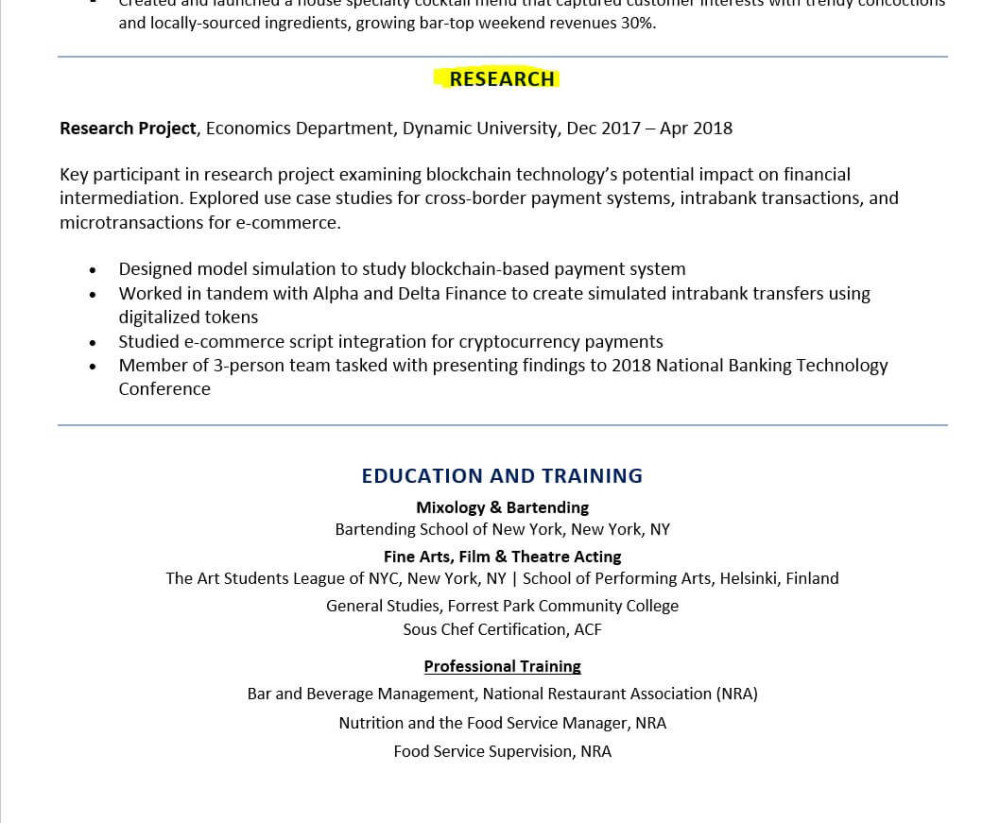
View 200+ more professional resume samples for all industries, along with a guide to writing resumes from our career experts.
You can also combine your research with other sections:
Research and Publications
Research and Professional Development
Educations and Research
We wrote a good post here on how to include publications on a resume.

Join more than 1 million people who have already received our complimentary resume review.
In 48 hours, you will know how your resume compares. We’ll show you what’s working--and what you should fix.
Some Important Research Skills You May Already Possess
When listing research skills on your resume, it’s important to remember that most of them won’t be core skills for the job you’re seeking. Unless you’re applying for a job as a researcher, these skills will basically be transferable skills. That means that they might not be essential for the position but will certainly enhance your value as a potential employee.
To better understand your own research skills, it’s important to be able to identify them.
Here are some common and valuable research skills that many employees possess. Chances are that you have used at least some of these skills in your career. For example:
Attention to detail. This seemingly simple skill is one that employers truly appreciate. People who possess an ability to note even the smallest details can be invaluable for identifying problems and creating solutions.
Planning and scheduling skills. Every research project starts with a plan and a schedule. This is also one of those transferable skills that has application throughout nearly every industry.
Data collection skills. Good research depends upon good data. If you’re a skilled data collector, that talent will be useful for any company’s research needs.
Problem-solving skills. At some level, all research is about solving problems. Whether it’s a graduate thesis or a corporate study, there’s always a question that needs to be answered.
Technical skills . Proficiency with computers and other technology is an essential skill for modern research.
Critical thinking skills. Data collection is useless if no one ever considers what that data means. That analysis requires critical thinking and the ability to analyze and draw conclusions.
Project management skills. Can you manage projects in an orderly and effective way? Every research project requires effective management.
Communication skills . Whether it’s an oral presentation or a written report, research findings always need to be communicated to others.
Make Your Research Skills Work for You
Finally, do more than just list your research skills in your resume. Put them to use. Research the company you’re trying to join, and mention things you’ve learned in your cover letter and interview. That can not only showcase your research abilities but will demonstrate your real desire to join their team. In the end, that can be the best way to improve your odds of landing that great job you need.
Related posts:
Writing Your Education Section: Samples & How to Guide
How To Find A Job Fast
ZipJob Team
The ZipJob team is made up of professional writers and career experts located across the USA and Canada with backgrounds in HR, recruiting, career coaching, job placement, and professional writing.
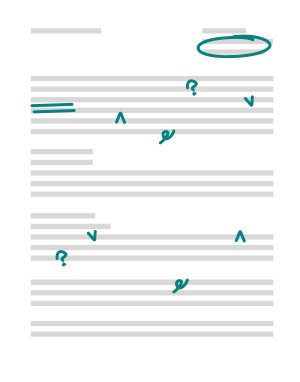
Is your resume working?
Find out with a free review from ZipJob.
Get a free resume review today
Our experts will review your resume’s grammar, layout, and ability to pass ATS — all free and delivered straight to your inbox.
PROTECT YOUR DATA
This site uses cookies and related technologies for site operation, and analytics as described in our Privacy Policy. You may choose to consent to our use of these technologies, reject non-essential technologies, or further manage your preferences.

Build my resume
- Build a better resume in minutes
- Resume examples
- 2,000+ examples that work in 2024
- Resume templates
- 184 free templates for all levels
- Cover letters
- Cover letter generator
- It's like magic, we promise
- Cover letter examples
- Free downloads in Word & Docs
7 Real Research Assistant Resume Examples That Worked in 2024
Research Assistant

Best for senior and mid-level candidates
There’s plenty of room in our elegant resume template to add your professional experience while impressing recruiters with a sleek design.
Resume Builder
Like this template? Customize this resume and make it your own with the help of our Al-powered suggestions, accent colors, and modern fonts.
- Research Assistant Resumes
- Postsecondary Research Assistant Resumes
As a successful research assistant, you’re a thorough data analyst, a top-notch lab technician, a friendly participant coordinator, and an organized librarian, all rolled into one.
However, demonstrating these skills on your research assistant resume can feel more overwhelming than autoclaving an entire lab’s worth of equipment. Not to mention, you may not know whether your school wants a CV or a resume . And what about writing a cover letter ? Where to start?
Don’t fret—we’ll walk you through what makes a good research assistant resume and how to stand out among your peers.
Our seven research assistant resume samples have helped researchers across disciplines land jobs in top labs and departments in 2024. If you’re stuck, pick a resume template complete with sample points to brainstorm your best resume yet!
Research Assistant Resume
or download as PDF
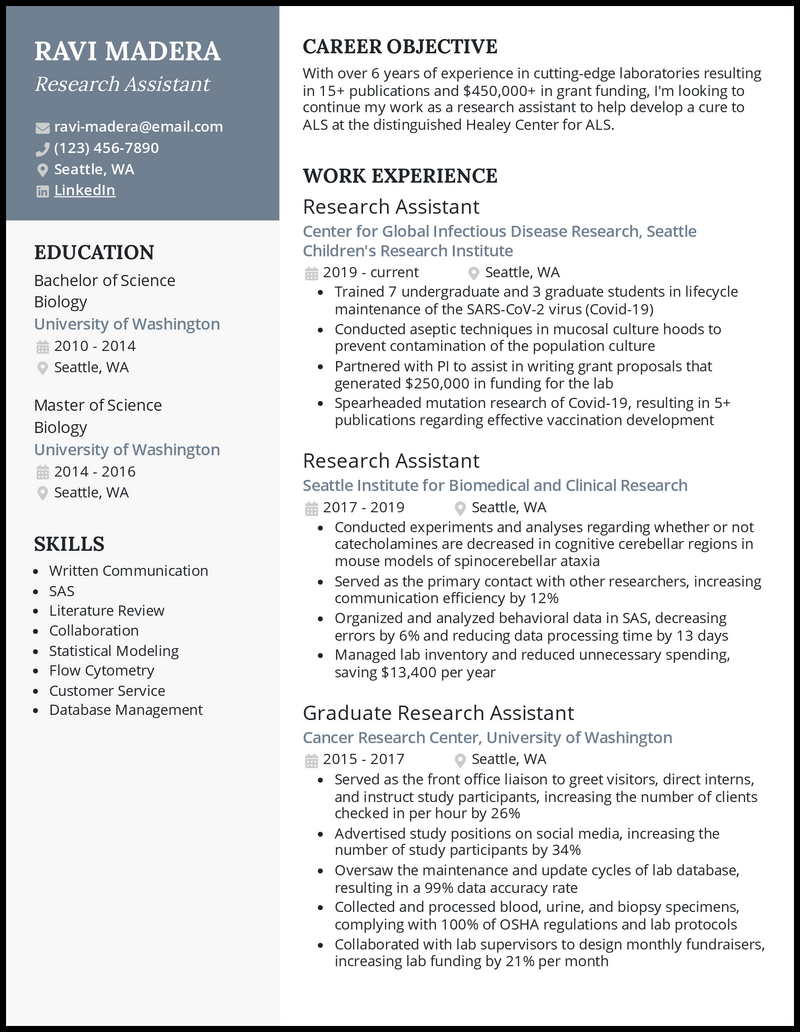
Why this resume works
- Ensure your resume includes keywords from the job description, especially in your resume skills section .
- Also, be crystal clear about your past research experience. Remember, the person reviewing your resume might not work in the same field, so you need to be abundantly clear about what research you conducted and how you executed your research.
- If any of the research you contributed led to a publication, be sure to mention it. While this isn’t the ultimate goal of research, it’s definitely a feather in your cap.
Entry-level Research Assistant Resume

- This section lets you discuss an interest in a particular field (and in a particular research assistant position). So, tailor this section for every application you submit!
- Even if the projects aren’t relevant to the field of research you’d like to study, adding them highlights transferable skills like data analysis and experiment design. Plus, it fills up space so you’re not worried about filling up a whole page.
Laboratory Research Assistant Resume
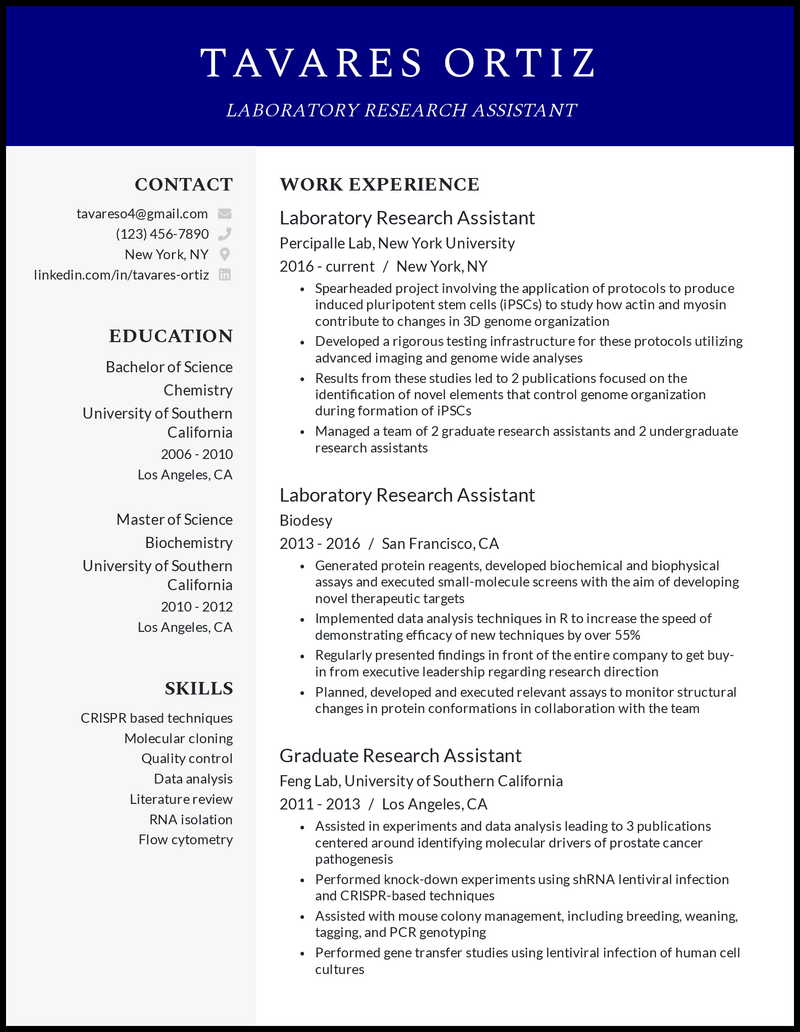
- Use numbers to discuss publications, team members you managed, money you saved, grant funding you helped acquire, or the outcome of your data analysis. If numbers can measure it, include it!
- However, unlike your data, these numbers don’t have to be perfectly accurate—they can be rough estimates.
- Before you hit submit, run your resume through a resume checker or a spellcheck system (Grammarly is a good place to start). Better yet, after you run it through AI, have a trusted colleague review it, too.

Clinical Research Assistant Resume
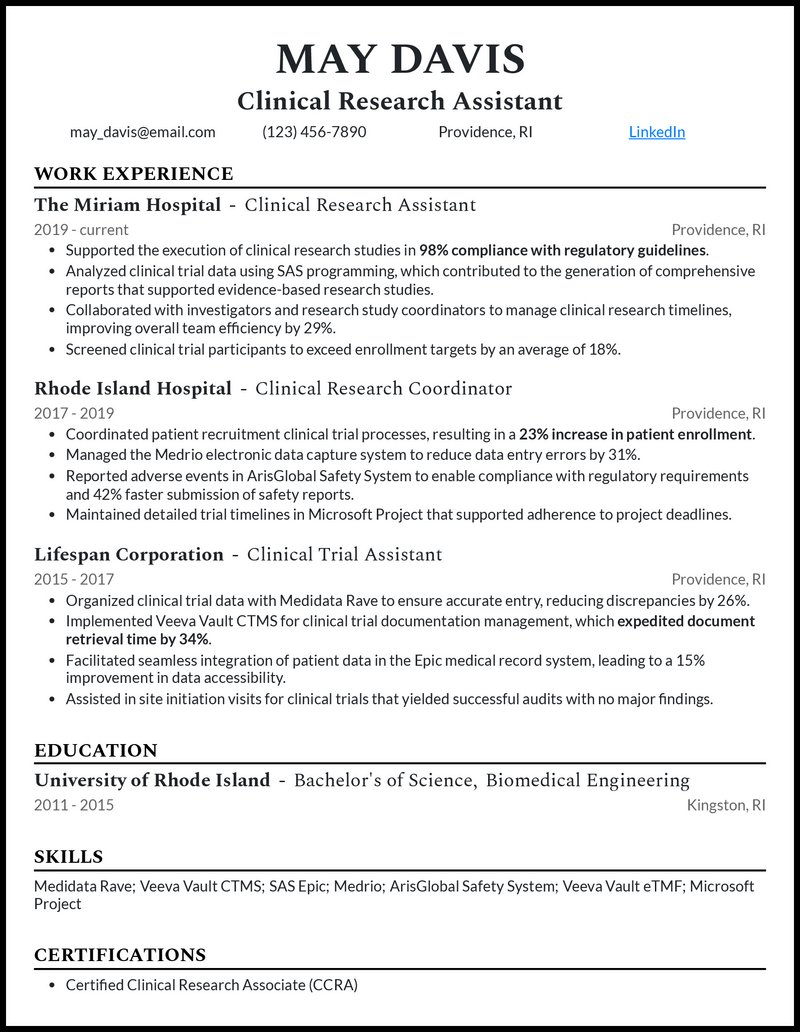
- Highlight your track record of adhering to guidelines in past trials to help your clinical research assistant resume stand out.
Undergraduate Research Assistant Resume

- However, even if you don’t have experience as a research assistant, include whatever work experience you have. Having any sort of job demonstrates responsibility, initiative, and the ability to work with others well.
- Choose a template that allows you to add sections (like projects) to make up for a lack of experience while also filling the page.
Graduate Research Assistant Resume
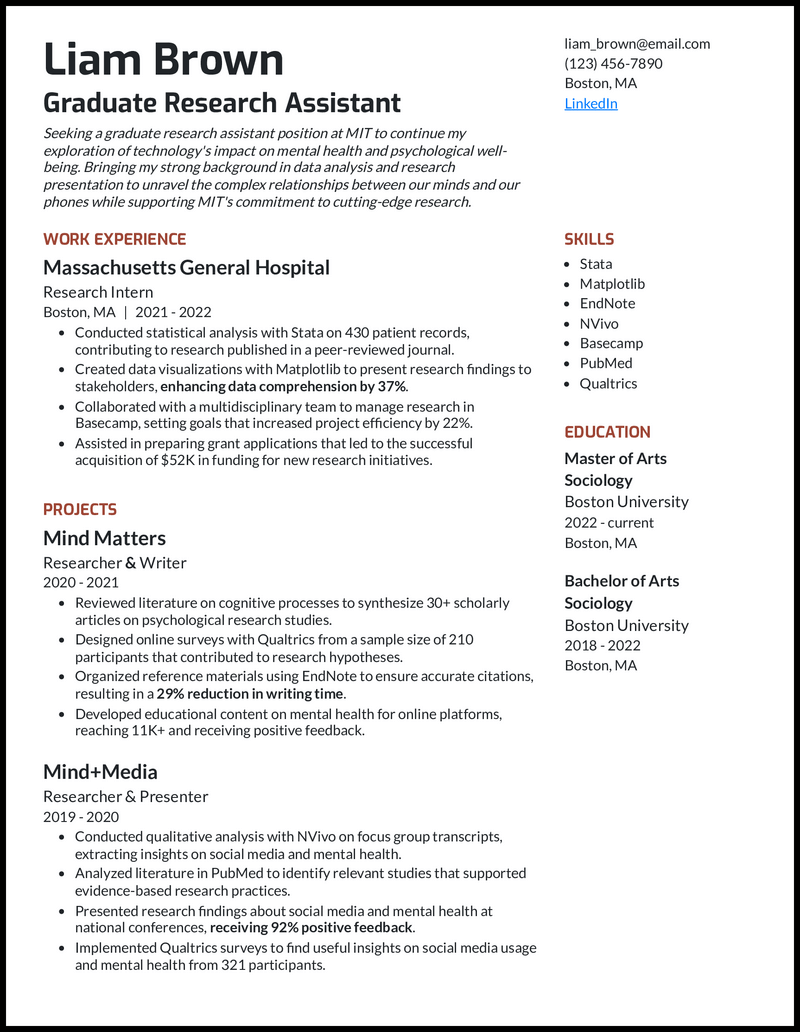
- A strong graduate research assistant resume should include a career objective that describes your topic of interest. Tell prospective programs how you’ll contribute to their legacy as a research institution through your work in the field.
Postdoctoral Research Assistant Resume
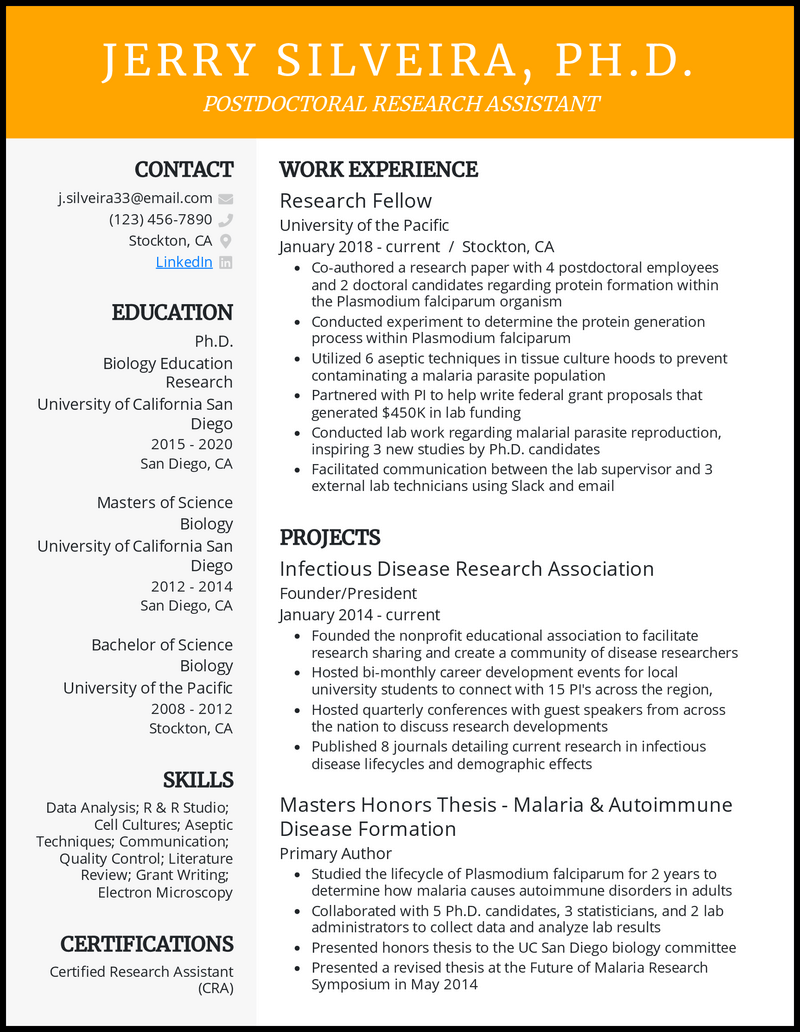
- This section highlights your expertise, years of experience in your field, and achievements. Just remember to tailor it for each application .
- Consider including projects such as club membership (especially if you founded it yourself), volunteer experiences, or independent research.
- Projects also make great examples to discuss in your research assistant cover letter .
Related resume guides
- College student
- Entry-level
- Grad school

- Career Blog
Researcher Resume Examples & Templates for 2024

When it comes to landing a job in the field of research, having a well-crafted resume can be the key to standing out in a competitive job market. A researcher resume is a document that summarizes your professional experience, education, skills, and other relevant information for a potential employer.
An impressive researcher resume can make all the difference in securing an interview and ultimately, landing the job. A strong resume showcases your strengths and highlights your achievements in past roles, making you an attractive candidate to potential employers.
The objective of this article is to provide examples and templates for creating a standout researcher resume. By following the tips and advice provided in this article, job seekers in the field of research can create a strong and effective resume that will impress potential employers. The article will cover everything from formatting and structure to key skills to include and common mistakes to avoid. Whether you’re a recent graduate or an experienced researcher, this article will provide the information you need to create a winning resume.
Researcher Resume Basics
When it comes to applying for a research position, your resume serves as a tool to showcase your skills, experience, and achievements. Therefore, you need to make sure your resume contains certain essential components, adheres to specific formatting guidelines, and highlights the relevant keywords and phrases.
Essential Components of a Researcher Resume
Your resume should provide a clear and concise overview of your professional profile. Therefore, it should contain the following essential components:
Contact Information: Include your full name, email address, and phone number. It is also recommended to add your LinkedIn or personal website URL.
Professional Summary: This section should highlight your most relevant skills, experience, and achievements. Keep it brief and to the point, but make sure to emphasize your unique selling point.
Education and Certifications: List all of your academic degrees, including the institution name, graduation date, and relevant coursework. Also, add any relevant certificates or licenses you have acquired.
Work Experience: This section should detail your professional experience and accomplishments. List your work history in reverse chronological order and use bullet points to highlight your achievements.
Skills: Specify your relevant technical and soft skills, including languages, software, and research methodologies.
Formatting Guidelines
In addition to the essential components, it is important to follow specific formatting guidelines to make your resume stand out. Here are some tips:
Use a clear and legible font, such as Calibri or Arial, with a font size of 11-12 pt.
Use bullet points and short sentences to increase readability.
Make sure your resume fits on one or two pages.
Use task-oriented language and focus on measurable achievements.
Include white space to create a visually appealing layout.
Keywords and Phrases for a Researcher Resume
Using relevant keywords and phrases in your resume is essential for attracting the attention of recruiters and hiring managers. Here are some common ones:
Research methodologies: Mention the specific methodologies you have experience in, such as quantitative and qualitative research, data analysis, and statistical modeling.
Technical skills: Emphasize your proficiency in tools commonly used in research, such as SPSS, R, Stata, and Excel.
Soft skills: Highlight your communication, collaboration, and problem-solving skills, which are essential for working in a research team.
Publications and presentations: Mention any research papers, articles, or presentations you have contributed to, as this indicates your expertise in specific areas.
By following these guidelines, you can create a powerful researcher resume that showcases your abilities and gets you noticed by prospective employers.
Researcher Resume Examples and Templates
General researcher resume samples.
For those starting out in their research careers or those looking to transition into research from another field, a general researcher resume template can be a great starting point. This type of resume should focus on highlighting transferable skills such as critical thinking, attention to detail, and excellent communication abilities, as well as any prior experience in research-related activities or projects.
General researcher resume samples should also feature a strong summary statement that emphasizes the individual’s passion and commitment to research, as well as any specific career objectives or goals. It is also important to highlight any relevant training or certifications that the candidate has received, including research methodology courses, data analysis tools, or project management training.
Early Career Researcher Resume Examples
For early career researchers, developing a well-crafted resume that highlights relevant experience and educational credentials is key. Early career researcher resume examples should reflect an emphasis on academic achievements such as dissertations, published research papers, and academic awards. Additionally, individuals with limited work experience in research-related positions may wish to focus on volunteer work or internships that demonstrate their commitment to research and their ability to effectively contribute to research projects.
In order to stand out in a competitive job market, early career researchers should also highlight any transferable skills that could be applicable to research roles, such as data analysis, project management, or communication skills. And building a strong professional network through conferences and other academic events can also help individuals in their job search efforts.
Experienced Researcher Resume Examples
For experienced researchers with a track record of success in their field, maximizing the impact of their resume is crucial. Experienced researcher resume examples should highlight their accomplishments in research, including publications, patents, and successful grant applications. They should also focus on showcasing specialized skills and knowledge in their areas of expertise, such as experience with specific research methods or advanced data analysis techniques.
When it comes to the presentation of their resume, experienced researchers can experiment with a more creative approach that sets them apart from the competition. For instance, they may wish to include a portfolio of their work or highlight their leadership experience in research teams. Ultimately, an experienced researcher’s resume should clearly communicate their depth of knowledge and expertise in their field.
Academic Researcher Resume Examples
Academic researchers require a highly specialized resume that speaks to their unique educational and professional backgrounds. Academic researcher resume examples should highlight educational degrees, including any doctoral or postdoctoral work, as well as academic honors and awards. They should also emphasize academic publications, presentations, and other scholarly contributions to the field.
Academic researchers may also wish to highlight their teaching experience, any service they’ve provided to their academic department or larger community, and any unique research projects they may have led or participated in. In contrast to other types of researchers, academics may find success in using a CV rather than a traditional resume format, given their extensive and diverse academic backgrounds.
Creating a Researcher Resume
A strong resume is essential for landing a researcher position. When creating your researcher resume, you should think carefully about how you present your skills, experience, and achievements. This section will explore best practices for creating a researcher resume, including assessing your skills and experience, writing a professional summary, designing a concise and relevant work history, showcasing achievements and awards, and highlighting education and training.
Assessing Skills and Experiences
Before you start writing your resume, it’s important to assess your skills and experiences relevant to the researcher position you’re applying for. Identify the key skills and experiences required for the role, then match those with your personal qualifications. Be sure to highlight your research experience, subject matter expertise, and analytical skills. Make a list of your hard and soft skills and use them to create a customized resume for each job you apply to.
Tips for Writing a Strong Professional Summary
Your professional summary is the first section of your resume and sets the tone for the rest of the document. It should be a concise statement that highlights your experience and qualifications for the position. Focus on what you can contribute to the organization – such as research experience, data analysis skills, or the ability to communicate complex ideas – to show your value. Be sure to tailor your summary to the specific job requirement, rather than using a generic statement for all applications.
Designing a Concise and Relevant Work History
Your work history should demonstrate your research expertise and accomplishments. Use bullet points to highlight your key responsibilities, achievements, and any relevant projects you’ve worked on. Make sure to use action verbs and include quantitative data wherever possible to showcase the impact of your work. If you’ve had multiple positions, only include those that are relevant to the job you’re applying for. Keep your work history concise, specifically highlighting the experience that reflects why you’re a candidate for the role.
Showcasing Achievements and Awards
When listing your achievements and awards, make sure they are relevant to the researcher position. These can include any publications, conference presentations, or research projects that demonstrate your skills and expertise to your team successfully. If possible, quantify your achievements to show the impact of your research. Aim for achievements and awards from the past two years to keep things up to date and make an impact.
Highlighting Education and Training
In the education and training section of your resume, make sure to include your degrees and certifications that are relevant to the researcher job. You can also include any relevant training courses or workshops you’ve attended to learn new research methods or techniques. If you have a significant amount of experience or a degree in a relevant field, your education section will likely be less extensive but still relevant to show the baseline understanding of the field.
When designing your researcher resume, make sure to tailor it to the specific job you’re applying for.
Customizing the Researcher Resume
Customizing your researcher resume can be the key to land your dream job in your field of expertise. Employers are always looking for individuals who match their job description and have the skills required for the job. As a researcher, you must demonstrate that you can do just that.
Here are some tips to keep in mind when customizing your researcher resume:
Tailoring to the Job Description
Tailoring your resume to the job description is a great way to show the employer that you have what they are looking for. A job description lists the necessary skills, qualifications, and experience required for the role. You should review the position’s job description thoroughly and tailor your resume to highlight the qualities that the employer is looking for. Use relevant keywords throughout your resume, so that your experience aligns with the job description.
Highlighting Transferable Skills
Transferable skills are the ones that you use in one industry, but that can be applied to another. Highlighting these skills gives you an advantage over other candidates when you are looking to transition to another industry. Communication, analytical reasoning, and problem solving are just a few examples of transferable skills that researchers possess.
Addressing Employment Gaps
Employment gaps can be stigmatized as lack of commitment, poor work ethic, or lack of experience. Employers recognize that researchers often work on specific projects, and as a result, they might have gaps between jobs. Be honest about gaps in your employment and explain them as briefly and truthfully as possible. You can use transferable skills such as volunteering, freelancing, or acquiring additional certifications to fill in any gaps.
Emphasizing Relevant Experience
Emphasis relevant experience on your resume within your field of expertise. This experience should include any research, publication, and presentations you have conducted or participated. If you are applying for a position in a specific industry, emphasize the relevant work experience you have in that industry.
Using Action Words and Phrases
Action-oriented language can make a difference to grab the employer’s attention. Keep your sentences short and begin with strong action verbs, such as “Directed,” “Conducted,” or “Developed.” Use power words like “Managed,” “Created,” “Improved,” or “Instituted,” whenever possible.
When customizing your researcher resume, remember that making your resume stand out can make a difference. Tailoring your resume to the position, emphasizing your transferable skills, addressing any employment gaps, and providing an emphasis on relevant experience using action words and phrases will make for a winning researcher’s resume.
Cover Letter for a Researcher Resume
When it comes to applying for a research position, a cover letter can be just as important as a strong resume. A cover letter is an opportunity to introduce yourself, highlight your key qualifications, and showcase your enthusiasm for the position.
Purpose and Importance of a Cover Letter for Researcher Position
The purpose of a researcher cover letter is to convince the employer that you are the best candidate for the job. It is your chance to showcase your personality, research experience, communication skills, and other relevant qualifications that might not be evident in your resume.
A well-written cover letter can make you stand out from the competition and increase your chances of being invited for an interview. It demonstrates your interest, professionalism, and attention to detail, making a positive first impression on potential employers.
Components of a Researcher Cover Letter
A researcher cover letter should be concise, informative, and tailored to the specific job you are applying for. It should include the following components:
Header: Start with your name, address, phone number, and email address.
Salutation: Address the letter to the hiring manager or the person who is responsible for the hiring decision.
Introduction: In the opening paragraph, introduce yourself and explain why you are writing this letter. This is a good place to mention the job title you are applying for and where you heard about the position.
Body Paragraphs: In the next few paragraphs, highlight your relevant qualifications and skills that make you an ideal candidate for the position. You can provide specific examples of your research experience, publications, software skills, or any other relevant qualifications that showcase your potential value to the employer.
Closing Paragraph: End your letter by thanking the employer for considering your application, and express your interest in the position. You can also mention that you look forward to hearing from them soon and provide your contact information one more time.
Closing Salutation: Sign off your letter with a professional closing such as “Sincerely” or “Best regards,” and include your name and signature.
Best Practices for Writing a Researcher Cover Letter
To write an effective researcher cover letter, follow these best practices:
Customize Your Letter for Each Job: Avoid sending generic cover letters. Instead, tailor your letter to the specific job and employer, showcasing your interest and enthusiasm for the position.
Keep It Concise: Your cover letter should be no longer than one page. Be concise and focus on your main qualifications that make you a good fit for the position.
Showcase Your Research Skills: Make sure to highlight your research experience and skills, including any publications, citations, or presentations that demonstrate your expertise.
Provide Specific Examples: Use specific examples to demonstrate your qualifications and how they align with the employer’s requirements.
Supplementary Materials for a Researcher Resume
When it comes to creating a strong researcher resume, it’s important to not only highlight your education and work experience, but also include any relevant supplementary materials that can set you apart from other candidates.
Here are four types of supplementary materials that can help strengthen your researcher resume:
Recommendation Letter
A strong recommendation letter can provide valuable insight into your work ethic and research abilities. Consider asking a former professor or supervisor for a recommendation letter that highlights your research skills, attention to detail, and ability to collaborate with others.
Research Publications and Presentations
If you’ve had any research publications or presentations, it’s important to include them in your resume. This demonstrates your ability to conduct in-depth research and share your findings with others. Be sure to include the title of the publication or presentation, the date it was published or presented, and any co-authors or collaborators.
Certifications and Licenses
Include any certifications or licenses that are relevant to your research work. This could include medical licenses, lab certifications, or specialized training in data analysis or research methodology. These certifications and licenses demonstrate your commitment to continued learning and your proficiency in your field.
Professional Associations and Memberships
Membership in professional associations and organizations shows that you’re committed to staying up-to-date with the latest research trends and techniques. If you’re an active member of any professional organizations, include them on your resume. This also demonstrates your willingness to collaborate with other researchers and expand your professional network.
Including supplementary materials in your researcher resume can help you stand out from other candidates and demonstrate your dedication to research and continued learning. As you prepare your resume, consider which supplementary materials are most relevant to your experience and field of research.
Additional Advice
When it comes to your researcher resume, the content is important, but so is the strategy behind it. Here are some additional pieces of advice to help you succeed in your job search:
Follow-Up and Networking
Don’t be afraid to follow up with the hiring manager after submitting your application. A brief email or phone call can show your enthusiasm for the position and keep you at the top of their mind.
Networking is also crucial in the job search process. Connect with others in your field through online communities or industry events. You never know who may have a connection to a hiring manager or know of an unadvertised job opening.
Job Search Techniques
Don’t limit yourself to online job postings. Consider reaching out to companies directly or working with a recruiter who can help connect you with opportunities.
Additionally, tailor your resume and cover letter to each job you apply for. Use the job description as a guide for highlighting the most relevant skills and experiences.
Common Mistakes to Avoid
One common mistake is using generic language and phrases in your resume. Avoid buzzwords and focus on specific accomplishments and skills.
Another mistake is submitting a one-size-fits-all resume. Take the time to customize your resume to each job you apply for to increase your chances of standing out.
Frequently Asked Questions
How long should my resume be? Ideally, your resume should be one to two pages in length. However, if you have extensive experience or multiple relevant skills, it may be acceptable to have a longer resume.
Should I include references on my resume? No, it’s not necessary to include references on your resume. You can provide them separately if requested by the employer.
How often should I update my resume? It’s a good idea to update your resume every six to twelve months, even if you’re not actively job searching. This ensures that you always have an up-to-date version on hand.
By following these tips, you can create a strong researcher resume and increase your chances of landing your dream job. Good luck in your job search!
Related Articles
- Salaried Employee: A Clear Guide to Understanding What It Is
- Office Secretary Resume: Example and Writing Guide for 2023
- Firefighter Resume Writing: A Step-by-Step Guide & Template
- Business Consultant Resume Examples for 2023
- Corporate Accounting: Crafting a Winning Resume in 2023
Rate this article
0 / 5. Reviews: 0
More from ResumeHead

- Research Analyst Resume Example
Resume Examples
- Common Tasks & Responsibilities
- Top Hard & Soft Skills
- Action Verbs & Keywords
- Resume FAQs
- Similar Resumes
Common Responsibilities Listed on Research Analyst Resumes:
- Developing research plans and strategies
- Conducting primary and secondary research
- Analyzing data and creating reports
- Interpreting research results and making recommendations
- Identifying trends and patterns in data
- Developing survey questions and conducting surveys
- Creating presentations to share research findings
- Staying up to date on industry trends and developments
- Collaborating with other departments to ensure research objectives are met
- Maintaining accurate records of research activities
- Providing support to other research teams
Speed up your resume creation process with the AI-Powered Resume Builder . Generate tailored achievements in seconds for every role you apply to.
Research Analyst Resume Example:
- Developed and executed comprehensive research plans and strategies, resulting in a 25% increase in data accuracy and a 15% improvement in research efficiency.
- Analyzed primary and secondary research data to identify key trends and patterns, leading to the development of actionable recommendations that contributed to a 10% increase in customer satisfaction.
- Collaborated with cross-functional teams to ensure research objectives were met, resulting in the successful launch of a new product that generated $1M in revenue within the first quarter.
- Conducted in-depth surveys and interviews to gather primary research data, resulting in the identification of customer preferences and needs that informed product development decisions and led to a 20% increase in market share.
- Created visually impactful presentations to effectively communicate research findings to stakeholders, resulting in a 30% improvement in decision-making processes and a 10% increase in project success rate.
- Maintained accurate records of research activities and data, ensuring compliance with industry regulations and facilitating seamless knowledge sharing among team members, resulting in a 15% reduction in research errors.
- Interpreted research results and provided actionable insights to senior management, contributing to the development of strategic initiatives that led to a 10% increase in revenue and a 5% improvement in customer retention.
- Stayed up to date on industry trends and developments, conducting competitor analysis and market research, resulting in the identification of new market opportunities and a 10% increase in market penetration.
- Supported other research teams by providing guidance and expertise, resulting in a 20% improvement in research quality and a 10% reduction in project timelines.
- Data analysis and interpretation
- Research planning and execution
- Primary and secondary research
- Trend identification
- Cross-functional collaboration
- Survey and interview conduction
- Presentation creation and delivery
- Record keeping and compliance
- Strategic insight provision
- Industry trend monitoring
- Competitor analysis and market research
- Team leadership and guidance
- Quantitative and qualitative research
- Statistical analysis
- Data visualization
- Project management
- Critical thinking
- Communication skills
- Attention to detail
- Problem-solving skills
- Proficiency in research software and tools
- Time management skills
- Knowledge of data privacy standards
- Adaptability to new research methodologies
- Proficiency in Microsoft Office Suite (Excel, PowerPoint, Word)
Top Skills & Keywords for Research Analyst Resumes:
Hard skills.
- Quantitative Research Methods
- Qualitative Research Methods
- Statistical Analysis
- Data Collection and Management
- Survey Design and Implementation
- Market Research Techniques
- Data Mining and Analysis
- Statistical Software (e.g., SPSS, SAS, R)
- Database Querying (e.g., SQL)
- Report Writing and Presentation
- Trend Analysis
- Forecasting and Predictive Modeling
Soft Skills
- Analytical Thinking and Problem Solving
- Attention to Detail and Accuracy
- Research and Information Gathering
- Data Analysis and Interpretation
- Critical Thinking and Logical Reasoning
- Time Management and Organization
- Written and Verbal Communication
- Collaboration and Teamwork
- Adaptability and Flexibility
- Curiosity and Continuous Learning
- Ethical Conduct and Integrity
- Presentation and Visualization Skills
Resume Action Verbs for Research Analysts:
- Synthesized
- Interpreted
- Investigated
- Collaborated
Generate Your Resume Summary

Resume FAQs for Research Analysts:
How long should i make my research analyst resume, what is the best way to format a research analyst resume, which keywords are important to highlight in a research analyst resume, how should i write my resume if i have no experience as a research analyst, compare your research analyst resume to a job description:.
- Identify opportunities to further tailor your resume to the Research Analyst job
- Improve your keyword usage to align your experience and skills with the position
- Uncover and address potential gaps in your resume that may be important to the hiring manager
Complete the steps below to generate your free resume analysis.
Related Resumes for Research Analysts:
Data analyst, business analyst, research assistant, research associate, research manager, research scientist, senior data analyst, business intelligence analyst.
University of Missouri
- Bias Hotline: Report bias incidents
Undergraduate Research
How to put research on your resumé.
Resumés are important documents for all kinds of application packages — jobs, scholarships, grad school, etc. Your resumé should fit within the total package highlighting your achievements in a concise manner that can be further expounded upon in your personal statement, cover letter, or your letters of reference. It is important to custom tailor your resumé to any particular position, or program you are applying for. Some information needs to be emphasized more than other depending on what the reviewers may be looking for.
Using Your Space Wisely
In general, a resumé should be no more than two pages long — unless you have a large number of presentations or publications that need to be listed. Avoid the tendency to add more “stuff” to your resumé to try to look impressive. Use the relevant experience you have and determine what was impressive about it (for example, demonstrated independence, innovation, grit, or tenacity; helped improve ways of doing things in the lab; were given additional responsibilities as time went on; etc.)
- A reviewer would rather read about the two positions you had that are relevant, than try to sift through seven or eight clubs or fast-food job descriptions.
- Transcript?
- Recommendation Letters?
- Personal Statement?
Typically, resumes are formatted so that your most recent position is listed first. However, don’t put working at Dairy Queen first, if you are applying for a research position. Instead, consider using some of the following sections:
- Academic Accomplishments
- Research Experience
- Work Experience/Employment
- College Activities
- Volunteer Work
- Presentations and Publications
You do not need all of these categories, especially if you do not have relevant, interesting, or recent experience with them. Do not feel forced to try to fit your resume into someone else’s template. Make a list of what you want to include then design categories that fit your experience and story. Keep in mind that these categories will change over time (for example: five years after college, you will no longer need to include a section on “college activities”).
Research Mentor
- Area of research
- Not only does it show that you worked directly with a faculty member in your position, but reviewers might be familiar with your mentor’s work which could put you at an advantage.
- Consider listing projects and accomplishments the group achieved first before breaking things out on a year to year basis.
- If you were funded by different sources at different times, put a list of these sources at the bottom of the experience in this position.
Job Titles, Time Periods
- Use something that makes sense (sometimes HR titles do not)
- Instead of “MUURS Scholar” say “Student Researcher funded by the MU Undergraduate Research Scholars Program”
- Summer 2017 (9 weeks, full time internship)
- Academic Year 2018-2019 (15 hrs/week)
- What does that award mean?
- Will anyone outside of campus know what that is?
- Was the program selective?
- What was the award amount?
- What was the duration of the award?
- You can list various funding sources at the end of the relevant section
- External funding (from a government entity such as NIH, for example) is impressive. Be sure to list it.
You need to take the time to seriously consider your experience and how that allowed you to grow and mature as a researcher. Ask yourself these questions when brainstorming about your experience:
- What are areas you excelled in?
- What are lessons you learned?
- What are things you improved upon from the person before you?
- How did you spend your time?
- What skills did you gain?
- What research outcomes were reached?
- How long were you in the lab?
Use specific numbers or other qualifiers when applicable to show just how much work, effort, independence, or tenacity you had.
If your publication and presentation experience is limited, it is recommended that you include it with your relevant experience. However, if you have extensive or otherwise impressive experience (won a presentation award at a conference, or presented your work to state legislators at the Undergraduate Research Day at the the State Capitol, for example) then include a new category specifically for Presentations and/or Publications.
Presentations
- Include full list of authors
- Include full and official title
- Include if it was poster or oral presentation (ie, 15 minute presentation)
- Include location, event
- Include date (at least month and year)
- Include any award
- Check in with your mentor, to find out if a poster you co-authored was presented elsewhere.
Publications
- Full citation when published
- In Press – journal, date?
- Submitted for review – journal/date
- In preparation
- Check with your mentor as many projects are not completed by the time as student graduates.
Final Reminders
- Know your audience
- Explain (or spell out)
- Organize to fit your own situation
- Make it easy to follow – esp. if you have ‘time away’
- But have on comprehensive and cohesive running resumé.
- Have a system in place to update/organize your resumés.
- Use professional language, as most files are submitted electronically — the reviewer will see if you named a file “Better Resumé”
- ex: Jane Doe Resumé – Biochemistry REU, UT Austin
- This will ensure that the reviewer knows who you are and what you are applying for without even opening the file.
We encourage students to visit the MU Career Center in the Student Success Center for help on their specific application needs.
Explore Jobs
- Jobs Near Me
- Remote Jobs
- Full Time Jobs
- Part Time Jobs
- Entry Level Jobs
- Work From Home Jobs
Find Specific Jobs
- $15 Per Hour Jobs
- $20 Per Hour Jobs
- Hiring Immediately Jobs
- High School Jobs
- H1b Visa Jobs
Explore Careers
- Business And Financial
- Architecture And Engineering
- Computer And Mathematical
Explore Professions
- What They Do
- Certifications
- Demographics
Best Companies
- Health Care
- Fortune 500
Explore Companies
- CEO And Executies
- Resume Builder
- Career Advice
- Explore Majors
- Questions And Answers
- Interview Questions
How To Write A Resume In 7 Steps (With Examples)
- How To Write A Resume
- Resume Skills Section
- Resume Objective Section
- Career Objective Section
- Resume Reference Section
- Resume Summary Section
- Resume Summary Example
- Resume Interests Section
- Address On Resume
- Relevant Work Experience
- Anticipated Graduation Date On Resume
- Education Section On Resume
- Contact Information On Resume
- Statement Of Qualifications
- How To List Publications On Resume
- Accomplishments On Resumes
- Awards On Resume
- Dean's List On Resume
- Study Abroad On Resume
Resumes are still the most important document in your job search . Generating a professional and interesting resume isn’t easy, but there is a standard set of guidelines that you can follow. As hiring managers usually only spend a short time looking over each resume, you want to make sure that yours has a reason for them to keep reading.
If you’re looking to write a resume, rewrite a resume you already have, or are just curious about resume format, then you’ve come to the right place. This article will go through the steps to writing an excellent resume, as well as offering examples for what sections of the resume should look like.
Key Takeaways:
A resume is a short document that details your professional history in a way that tailors your experience and skill set for the particular job you’re applying for.
Resumes follow a few standard formatting practices, which hiring managers and recruiters expect to see.
Highlighting your work experience, skills, and educational background with relevant keywords can help you get past applicant tracking systems and into more interviews.
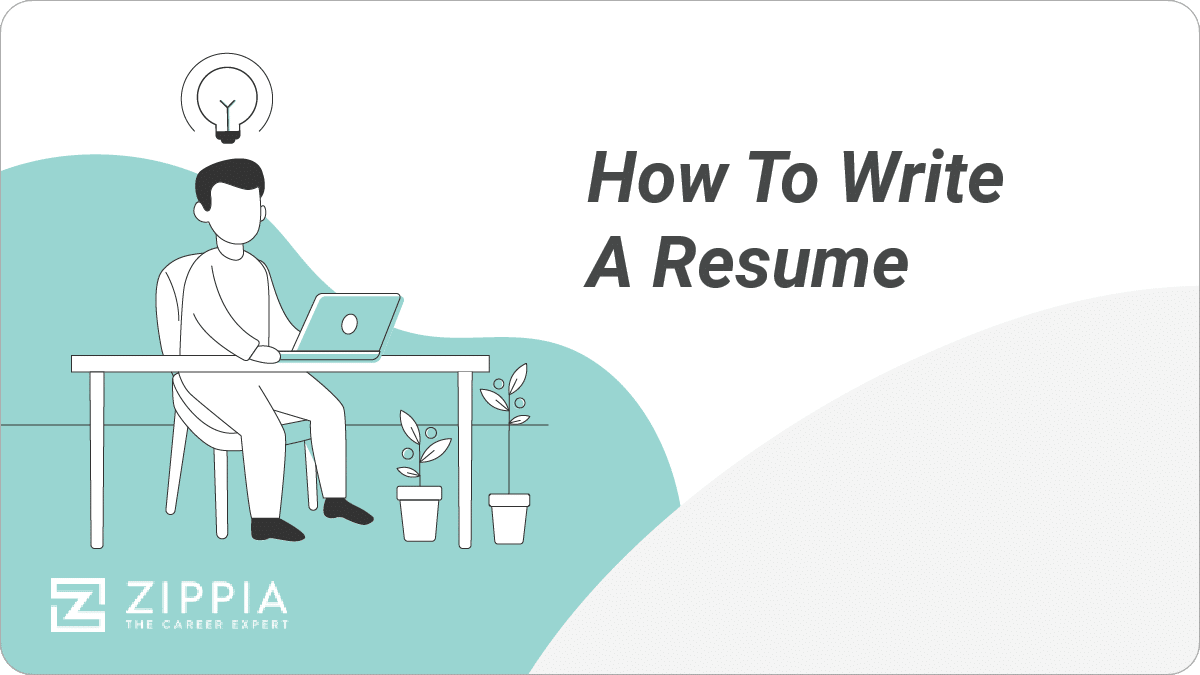
How to write a resume
Writing a resume involves using the proper formatting, writing an introduction, and adding your work experience and education. Stuffing your entire professional life into a single page resume can feel overwhelming, but remember that you’re distilling the relevant parts of your professional experience in order to catch the eye of the recruiter .
Formatting your resume. To start, use a word processor such as Microsoft Word or Google docs. Standard resume formatting calls for:
1 inch margins
10-12 point font
A professional, commonly-used font
Additionally, there are three resume formats that are commonly used. Most people should stick with a chronological resume format , but the combination resume format and functional resume format can be effective for more advanced workers or those who have significant gaps in their resume.
Write a resume header . It doesn’t matter if you have the best resume in the world if the hiring manager can’t contact you. Every single resume should include the following contact information:
Your full name. First and last.
Your phone number. Use a personal phone number, and make sure your voicemail is set up properly.
Your email address. Nothing inappropriate — [email protected] is a safe choice.
Location. City, State, Zip Code is fine, but you can include your full mailing address if you think it’s appropriate.
Your social media (optional). LinkedIn is the obvious one you’d want to include, but make sure your profile looks good. If you have an online portfolio , either on a personal blog/website or on a site like Journo Portfolio , feel free to include that here as well.
Your job title. Also optional, but can be useful for applicant tracking systems.
Resume introduction. You have four options for your resume introduction: a resume objective, summary statement, resume profile, or qualifications summary. For most job-seekers, a resume summary statement is the best choice. Regardless of which resume introduction you choose, avoid first-person pronouns (I/me/my).
Resume objective. A resume objective is the goal of your resume. Since the objective of every resume is to land a job, this is not the most original or impressive opener you can have.
On the other hand, it’s a good choice for an entry-level applicant or someone who is changing career paths . This should be a 1-3 sentence summary of why you’re motivated to get the position you’re applying for.
Who should use a resume objective: Entry-level applicants, career-changers, and recent college graduates.
Resume summary. This is the best opener for most job-seekers. As the name suggests, a resume summary highlights the most salient aspects of your resume.
It should include your current position, how many years of experience you have, some of your biggest achievements, and possibly your career goals. This should be a 1-3 sentence spiel and should include some quantifiable experiences.
Who should use a resume summary: Most job seekers; anyone with quantifiable accomplishments to emphasize and a broad range of skills.
Qualifications summary. A bullet point list (4-6 points is the sweet spot) of your qualifications for the position. It’s best used by applicants going for jobs that require a fixed skill set. It’s not a great choice for entry-level applicants who lack quantifiable achievements.
You’ll notice that a qualifications summary takes up more space than a resume objective or summary, but it can actually save the hiring manager time if you provide a bunch of valuable information right off the top.
Who should use a qualifications summary: Those applying to a job with requirements for certain skills and job-seekers who have a lot of experience in their industry and/or field.
Resume profile. A resume profile is similar to a resume summary, but goes into more detail about your accomplishments at your current or former job, while also telling the reader about your career goals. Think of a resume profile as a section that pulls all the best parts of your work experience section into one place.
Who should use a resume profile: Anyone with significant accomplishments under their belt, expertise in a niche field, or applying to a job in the same industry that they have lots of experience in.
Resume headline. Resume headlines aren’t necessary, but you can include one alongside any of the four types of resume introduction listed above. A resume headline comes between your contact information and the resume introduction of your choice.
Headlines can be used by entry-level applicants and experienced job-seekers alike. The important point is that your headline should be short and to the point. Additionally, you should use title case when writing your resume headline (capitalize words as you would for a book title).
Who should use a resume headline: Any job-seeker who wants to showcase their experience or unique value right off the bat.
Work experience. Your work experience section is the place to let hiring managers know that you have relevant experience that would allow you to handle the job you’re applying for.
If you’re using the chronological resume format, your work experience section would come after your resume summary/objective. In a funcitonal reumse, it would follow your skills section. Either way, work experience should be listed in reverse-chronological order (most recent experience at the top).
When listing your work experience, you should include all of the following information:
Job title. Start by stating the position you held at the company. These are easy cue for the hiring manager to look at and determine whether your past positions would help you succeed at their company.
Company Info. Include the name of the employer, the location where you worked, and perhaps a brief description of the company, if it isn’t a well-known name.
Dates Employed: Use the mm/yyyy format if you want to be sure that most applicant tracking systems (ATS) will pick it up. Whatever format you use for dates, be consistent, or your resume will look sloppy.
Job Description. Don’t just list your job’s responsibilities; hiring managers and recruiters already have an idea of your duties based on the job title. Instead, list your most important and impressive responsibilities/achievements at the job with bullet points. Determine which of these are most relevant for your new role based on the job description.
Ideally, each bullet should be no longer than a single line. However, two lines is acceptable, if used sparingly.
Always start with a strong action verb, followed by a quantifiable achievement and a specific duty. For example: “Developed ad campaigns for clients, increasing sales by an average of 27%.” Each job title should include 3-5 bullet points.
The order that you include this information can be changed around, as long as you are consistent throughout your resume. However, the bullet points detailing your job’s achievements should always be the last item for each entry.
It’s important that you tailor your resume’s work experience section to the job you’re applying for. We recommend reading the job description carefully and highlighting the action verbs in one color and the skills, adjectives, and job-specific nouns in a different color.
Educational background. In almost all cases, your education section should come after your professional history. If you’re a recent college graduate with limited work experience, you may choose to put your educational achievements first.
Like the section on your professional history, educational experiences should come in reverse-chronological order, with your highest level of education at the top. If you have a college degree, you don’t need to add any information about your high school experience. If you didn’t finish college, it’s okay to give a list of what credits you did complete.
Each educational experience can be listed in the following format:
Degree/Program Name College/University Name Dates attended
You don’t need to add anything else, especially if your resume is already impressive enough. But if you’re struggling to fill up the page, or you feel that aspects of your educational experience will help make you a standout, you may consider also including:
Minor. If you think it rounds out your not-exactly-relevant-to-the-job major nicely.
GPA. Only if it was 3.5 or higher. Otherwise, it’s not going to do you any favors to include this.
Honors. Dean’s List, Cum Laude, etc.
Achievements. If you wrote a killer thesis/dissertation that showcases intimate knowledge relevant to the job to which you’re applying, you can include its title and a very brief description.
Extracurricular activities. Only include if they’re relevant. For example, if you’re applying for a management position and you were president of your student government.
Certifications/Licenses. If the job you’re applying for requires/likes to see certain certifications or licenses that you have, you may include them in this section as well.
Skills section. Your impressive skills should be scattered logistically throughout your professional history section, but you should also include a section solely dedicated to highlighting your skill set . Skills can be broken down into two categories:
Hard skills are skills you learn through training and indicate expertise with a technical ability or job-specific responsibility.
Soft skills are your personality traits, interpersonal abilities, and intangible qualities that make you more effective at your job.
Your resume should have a healthy mix of hard and soft skills, as both are essential to job performance. However, since soft skills are harder to prove in the context of a resume, we recommend leaning more toward hard skills. Additionally, whenever you list a soft skill, make sure that it has a correlating item in your work experience section.
For example, if you say you are skilled in collaboration, you should mention a time when a team project was a major success somewhere in your work experience section.
Optional sections. If you still have space left or there’s more you want to show off that doesn’t quite fit in any of the above sections, you may consider adding an additional section covering one or more of the below categories:
Language . Being bilingual is always impressive, and can be included on a resume for any company. Highlight this more if your position involves liaising with international distributors and/or clients. Don’t lie about your proficiency level.
It may be best to not mention it if you’re not particularly proficient speaker . Such as if you took courses in school, or haven’t really managed to gain fluency. It can end up looking like an attempt to inflate your credentials, which you want to avoid.
Volunteer experience . Always a good thing to include. It shows you’re a team player who behaves in a way that promotes the greater good, without thought of personal gain. Especially good for entry-level candidates and those applying for jobs at a non-profit. If you have gaps in your work history, you can also consider including volunteer experiences in your work history section instead.
Personal projects. A personal blog, published works, or a portfolio of your past projects are all good things to include. They show you take initiative, enjoy and take pride in your work, and that you can handle the responsibilities of the job, if relevant.
Certifications/licenses. If you didn’t include these in your education section, this is another good place to list relevant certifications or licenses that you have.
Interests . This is largely just a space filler if your resume is light in other areas. However, if your hobbies are directly related to the job that you’re applying for, it’s not a bad idea to include them. And it might draw a recruiter’s attention if you end up sharing some of the same interests as they do.
If you have several seemingly random items that are valuable, but don’t warrant creating a whole separate section for, you can also make a section called “Additional Experience.” Here you can include all of the above categories in one place. Just make sure that each item is clear and easy for readers to understand.
Resume samples
Now that we have a good idea of how to write a resume, let’s take a look at some example resumes:
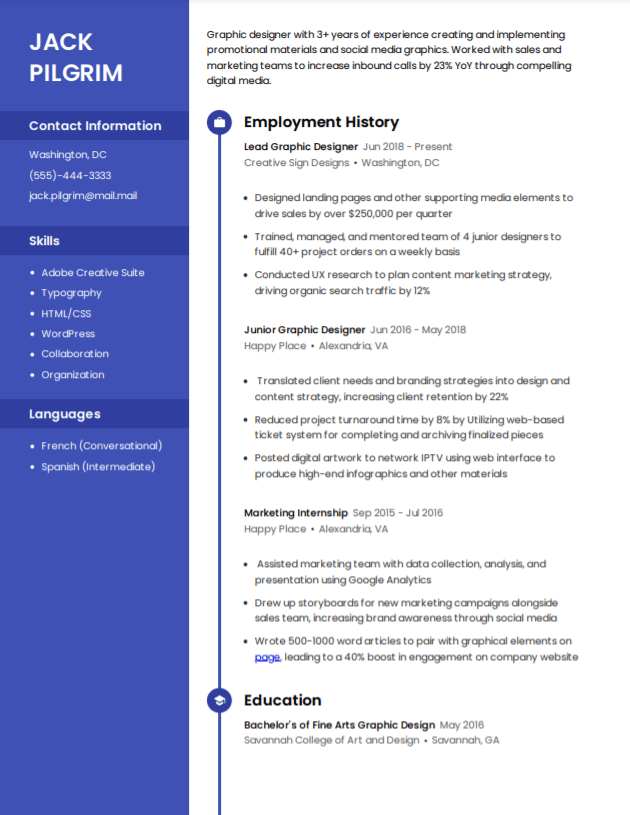
Jack Pilgrim Washington , DC 14015 – (555) 444-3333 – [email protected] – www.linkedin.com/jpilgrim Resume Summary Graphic designer with 3+ years of experience creating and implementing promotional materials and social media graphics. Worked with sales and marketing teams to increase inbound calls by 23% YoY through compelling digital media. Adept at planning, managing, and prioritizing multiple deadlines at once, and thrives in fast-paced work environment. Work Experience Creative Designs | Washington, DC Lead Graphic Designer | June 2018-Present Worked with sales and marketing teams to create landing pages, sales proposals, and supporting media elements to drive sales by over $250,000 per quarter Trained, managed, and mentored team of 4 junior designers to fulfill 40+ project orders on a weekly basis Conducted UX research through surveys, usability testing, and data analysis to plan content marketing strategy, driving organic search traffic by 12% Presented proposals, results, and status updates to set of 4-7 clients, ensuring customer satisfaction at or above 95% for 3 years straight Happy Place | Alexandria, VA Junior Graphic Designer | July 2016-May 2018 Translated client needs and branding strategies into design and content strategy, increasing client retention by 22% Reduced project turnaround time by 8% by Utilizing web-based ticket system for completing and archiving finalized pieces Posted digital artwork to network IPTV using web interface to produce high-end info-graphics and other materials Happy Place | Alexandria, VA Marketing Intern | September 2015-July 2016 Assisted marketing team with data collection, analysis, and presentation using Google Analytics Drew up storyboards for new marketing campaigns alongside sales team, increasing brand awareness through social media Wrote 500-1000 word articles to pair with graphical elements on page, leading to a 40% boost in engagement on company website Education Savannah College of Art and Design | Savannah, Georgia May 2016 Bachelor of Fine Arts in Graphic Design Skills Adobe Creative Suite Typography HTML/CSS WordPress Collaboration Organization
Allison Neederly Chicago, Illinois , 60007 | (333) 222-1111 | [email protected] | www.linkedin.com/allison.neederly Resume Summary Dedicated customer service representative with 4+ years experience resolving customers’ needs in-person, online, and over the phone. Top achiever at XYZ Inc. with a 100% customer satisfaction rate for Q1 of 2020. Friendly personable, and knowledgable about company’s products and services. Relevant Skills Customer Service Responded to upwards of 200 customer queries daily with XYZ Inc., reducing the average wait time by 56% and increasing customer satisfaction rates by 13% Ability to resolve conflict and create a positive atmosphere for shopping for both new and existing customers through technical proficiency Expert product knowledge and communication skills, and experience training and mentoring new customer service staff Web Chat and Phone Skilled in 3 web chat platforms for helping online customers resolve their queries quickly and accurately Achieved fastest call resolution rate at XYZ Inc., with an average resolution time of under 5 minutes per customer Performed outbound calls for customer satisfaction surveys, as well as writing web-based surveys for 10,000+ customers Troubleshooting Detailed product knowledge allowed for customer technical issues to be resolved at rate within top 5% of all customer service associates at XYZ Inc. Created manual for step-by-step directions for troubleshooting that was implemented for team of 100+ customer service reps Positive attitude took average tech-related negative response from 1/5 stars to 4/5 stars, increasing trust in brands and services Work Experience XYZ Inc. | Philadelphia, PA Customer Service Associate New Look Global | Burlington, VT Junior Customer Service Representative L.L. Bean | Burlington, VT Sales Associate Education University of Vermont | Burlington, VT May 2012 Bachelor of Arts in Humanities
Priya Laghari New York, NY | (222) 111-0000 | [email protected] | www.priyabizdev.com Resume Profile Strategy Development: Grew John Deere’s international sales by 13% by tapping into undeserved countries in Southeast Asia Management: Oversaw a team of managers representing marketing, sales, and product teams. Streamlined collaborative, cross-functional communications through agile and scrum management system CRM: Developed, customized, and implemented new customer relationship management database for accounts totaling over $10M in value Work Experience Business Development Manager 01/2015-Present Microsoft | Redmond, WA Developed product strategies and roadmap for Google AdWords, increasing inbound traffic by 26% YoY Reduced time training on new software by 50% for new and existing employees by implement e-learning programs Spearheaded digital marketing campaign worth $1M that saw a return of 200% in first year by qualifying leads earlier in the sales funnel Regional Sales Manager 11/2012-01/2015 Big Things Inc. | St. Louis, MO Managed territory encompassing 29 regional locations with an annual revenue of approx. $55M Worked with C-level executives to plan business strategies, resulting in 20% reduction in overhead costs Increased client retention by 12% in first year by implementing a CRM approach based on account profiling and elevating levels of relationship selling Account Manager 02/2009-11/2012 Solutions Corp. | Chicago, IL Implemented and developed CRM strategic plans, increasing retention of long-term clients by 22% Maintained 50+ accounts totaling over $35M in value Generated leads through one-on-one consultation via phone inquiries, online check-ins, and meeting office walk-ins Relevant Skills CRM: Proficient with Salesforce, Zoho, and HubSpot; some experience with Keap. Used various CRM software over a decade to successfully manage customer relations and quick to adapt to new software and tools that aid in quality of customer experience. Salesmanship: Negotiated and closed over several deals worth $1M+ and skilled in upselling and cross-selling. Adept at working closely with marketing and product teams to maximize the efficiency of the sales funnel for both inbound and outbound traffic. Presentation: Represented Microsoft Northwest Region at quarterly board meetings, ensuring all stakeholders were kept abreast of new developments and opportunities. Also deliver monthly presentations to big clients and vendors to maintain positive relationship. Data analytics. Expert at integrating data from various analytics platforms, including Google, Microsoft Power BI, and SAP BusinessObjects Education Colgate University | May 2008 MBA Fordham University | May 2006 Bachelor’s Degree in Business
For more resume examples and templates:
Resume examples by job
Google docs resume template
Resume templates
Resume builder
Resume Headers Samples:

Tip : Never put your contact info in the header of your document; some applicant tracking systems might miss it.
For more on how to write a resume header:
Resume Header
Resume Titles
Resume introduction examples
Entry-Level Resume Objective.
Recent graduate with a bachelor’s in Marketing from the University of Virginia seeking an entry-level role in content marketing. Excellent copywriter with 2+ years experience editing content as a member of the UVa Writing Center.
Career Change Resume Objective.
Eager to apply 7+ years of experience with customer success management to make successful outbound B2B calls, deliver customized business solutions to new and existing customers, and provide expert product knowledge in the role of Account Manager for XYZ Inc.
Example Resume Summary Statement.
Accountant with over 8 years of experience in the medical industry. Adept at advising on management of cash deficits, reconciling departmental accounts, and creating new accounts and codes. Coordinated invoice preparation system for ABC that reduced contractor overhead by 19% YoY.
English teacher with a love of language and 6 years of experience teaching high school students. Developed new curriculum that boosted freshman reading comprehension scores by 12% and created after school book club for AP Lit class, resulting in 100% of participating students achieving a 5 on the AP Lit test.
Example Qualifications Summary.
Executive assistant with 5+ years experience helping maintain efficiency in an office of 25 employees Communicated directly with internal and external stakeholders, helping Senior Vice President manage projects worth $5M+ Proactively managed office schedules, identifying and prioritizing changes to ensure client satisfaction Recognized in a company of 500 for “Outstanding Achiever” in May 2019
Example Resume Profile.
Detail-oriented IT Specialist with 4 years of experience overseeing and improving the infrastructure of IT systems. Adept at building and running troubleshooting systems and testing services. Decreased security risk by 47% through continual optimization, while also improving the speed of client portal by 22%. Excellent communicator both internally and for client-facing discussions. Achieved 98%+ customer satisfaction ratings through weekly and monthly check-ins with accounts valued cumulatively at $500,000.
Entry-Level Resume Headline.
Bilingual College Graduate with 80 WPM Typing Speed and Tutoring Experience
Experienced Resume Headline.
Business Development Specialist with 6+ Years Experience Scaling Start-Up Tech Teams
For more on resume introductions:
Resume objective statement
Resume summary statement
Resume summary statement examples
Qualifications summary
Sample resume work experience sections
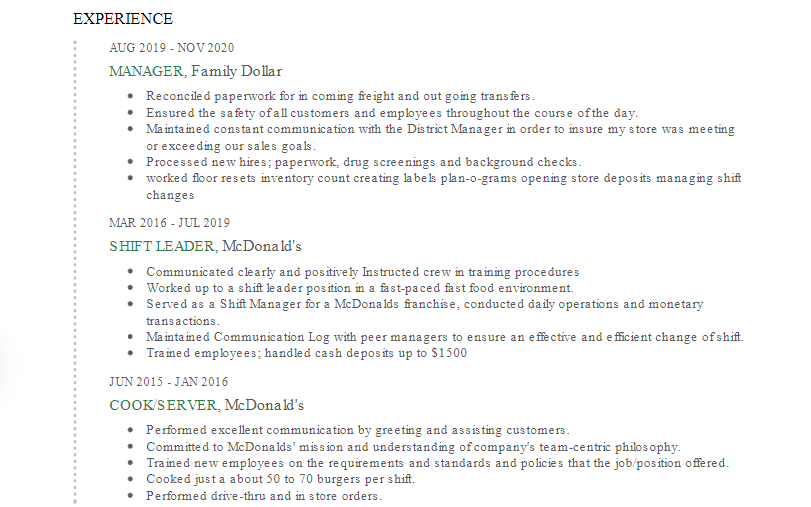
Work Experience XYZ Industries | Seattle, WA Marketing Associate | May 2019-Present Delivered weekly presentations to client-base to communicate brand messaging, increasing client retention by 11% Served as liaison between marketing and product teams, resulting in projects finishing 2 weeks early, on average Leveraged Excel skills to create and maintain spreadsheet to track consumer insights, emergent trends, and inform decisions of marketing team through competitive analysis Managed team of 5 contractors to juggle multiple priority projects simultaneously, never missing a deadline Initiated an affiliate referral program that PR team went on to turn into a revenue-generating stream valued at $30,000 annually ABC Corp | Seattle, WA Marketing Intern | September 2018-May 2019 Developed, maintained, and processed 20+ digital consent forms and distributor forms Worked collaboratively with a team of 10 marketing professionals, closely aligning our goals with the PR team Provided data analysis using Google Analytics and performed keyword research to increase blog traffic by 56% over six months Answered up to 50 customer queries by phone and email each week
For more on building the perfect resume work experience section:
Resume work experience section
First resume (no experience)
Examples Of Education Resume Sections
Graduated recently from a 4-year program.
Western Illinois University | Macomb, Illinois May 2020 Bachelor of Arts in Sociology | Minor in Psychology 3.95 GPA magna cum laude Dean’s List all semesters
Two degrees.
Fordham University | Bronx, New York April 2016 Master of Chemical Engineering Stony Brook University | Stony Brook, New York April 2014 Bachelor of Science in Chemistry
Anticipated graduation date (not yet graduated).
DePaul Univeristy | Chicago, Illinois Bachelor of Arts in History – Degree anticipated May 2021 Current GPA: 3.8
Older job seeker (graduated 10+ years ago).
University of Chicago | Chicago, Illinois Bachelor of Business Administration
High school graduate (no college degree).
Johnston High School 2016-2020 Head of Computer Club
More on crafting the perfect resume education section:
Education resume section
GPA on resume
Dean’s list
Magna cum laude
Examples Of Skills For Resume
Examples of hard skills include:
Examples of soft skills include:
Here’s more information on how to incorporate skills into your resume:
Resume skills section
Hard skills
Soft skills
Top skills for professionals
Skills-based resume
Resume writing FAQ
What is a resume?
A resume is a one to two-page document that focuses on professional experience, past achievements, education and certifications, and specific skills tailored to the job you’re applying for.
Almost every job application requires a resume, and hiring managers use them as a first impression in determining which applicants get a shot at an interview.
Whether you’re fresh out of college or have 30 years of professional experience, this guide should help craft a resume that stands out from the crowd and get you one step closer to landing your dream job.
What is the format for writing a good resume?
Most people will want to use a chronological or reverse-chronological resume format. This format is compatible with most applicant tracking systems (ATS) and is easy for employers to read. Additionally it helps highlight your experience, which helps prove your qualifications.
How far back should a resume go?
A resume should go back no further than 10 to 15 years. However, it is important that all your information is relevant. Therefore, do not include job experience that is irrelevant to your application, even if it’s fewer than 10 years old. Save that information for later discussions.
Should you personalize your resume for each job?
Yes, you should personalize your resume for each job you apply to. Many recruiters use ATS now, which will search for keywords in a resume and reject those that don’t have them. That means that the skills you choose to highlight as well as your opening, such as your resume summary, should be altered to suit each job you apply to.
You don’t need to rewrite the entire resume for each job, but it does show attention to detail and initiative to make sure that your resume is customized. It also makes it more likely that you’ll get past the first step of the process.
State of New York Department of Labor – Resumes, Cover Letters and Job Applications
Harvard University – Create a Resume/CV or Cover Letter
How useful was this post?
Click on a star to rate it!
Average rating / 5. Vote count:
No votes so far! Be the first to rate this post.

Matthew Zane is the lead editor of Zippia's How To Get A Job Guides. He is a teacher, writer, and world-traveler that wants to help people at every stage of the career life cycle. He completed his masters in American Literature from Trinity College Dublin and BA in English from the University of Connecticut.
Recent Job Searches
- Registered Nurse Jobs Resume Location
- Truck Driver Jobs Resume Location
- Call Center Representative Jobs Resume Location
- Customer Service Representative Jobs Resume
- Delivery Driver Jobs Resume Location
- Warehouse Worker Jobs Resume Location
- Account Executive Jobs Resume Location
- Sales Associate Jobs Resume Location
- Licensed Practical Nurse Jobs Resume Location
- Company Driver Jobs Resume
Related posts

Python Projects for Your Resume

How To Write A Skills-Based Resume (With Examples)
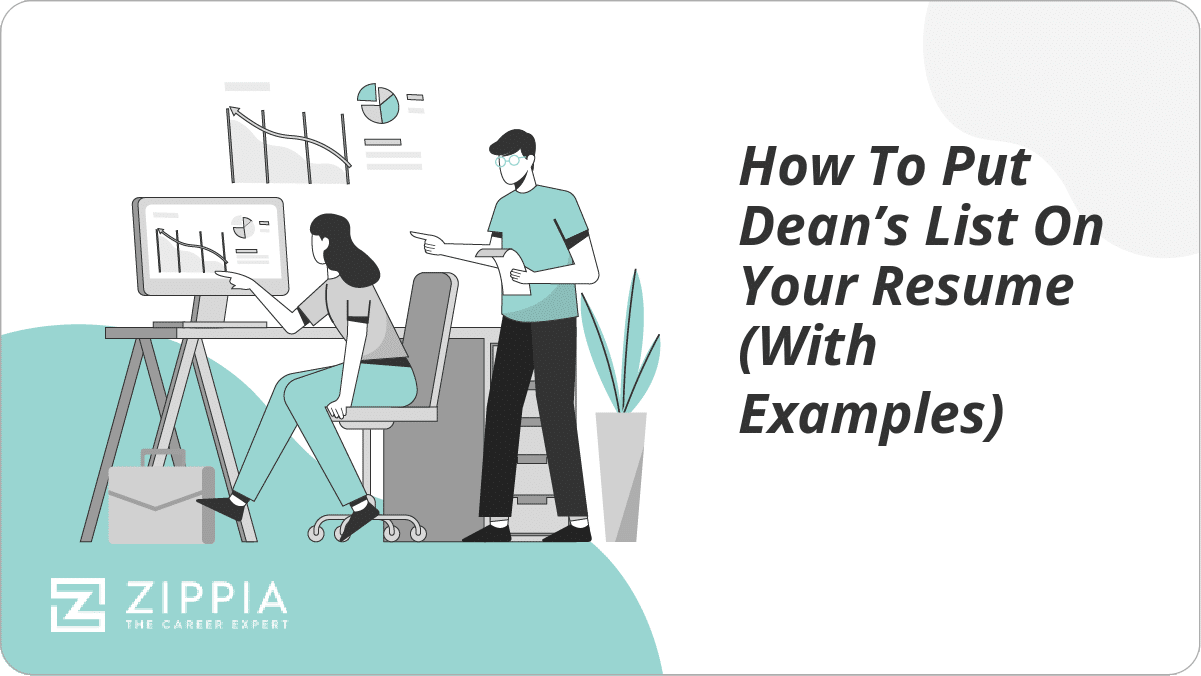
How To Put Dean’s List On Your Resume (With Examples)

Functional Resume: Examples And Tips
- Career Advice >
- Resume Structure >
- Parts Of A Resume >
- SUGGESTED TOPICS
- The Magazine
- Newsletters
- Managing Yourself
- Managing Teams
- Work-life Balance
- The Big Idea
- Data & Visuals
- Reading Lists
- Case Selections
- HBR Learning
- Topic Feeds
- Account Settings
- Email Preferences
4 Resume Mistakes to Avoid When You Don’t Have Much Experience
- Irina Cozma

A good resume can set you apart and help you land that interview.
Understanding the common mistakes job candidates make on resumes, and how to overcome them, can set you apart from your competitors. The first mistake is including irrelevant work experience. Instead, only add roles that are relevant to the position you’re applying for. The second is customizing your resume. While it’s in your benefit to adjust your resume to better match the job description, over-tuning your resume for every application can be a waste of time — and end up slowing down your search. This is especially true if you’re focused on securing a particular position that has a standard job title like “marketing coordinator” or “sales associate.” The third is overdesigning your resume. Recruiters only spend a few seconds scanning it, so keep the format simple and straightforward. The fourth is coming off as a novice. For example, don’t use an ancient email address — update it to something that sounds more professional, and give your resume a specific name so it’s easier to identify.
Resumes. Love them or hate them, you will probably need one when you apply for a job. The resume has a specific tactical role to play in your search — to get you the interview. You need to make sure it checks a few boxes to do that work because, even if you take advantage of your network, sooner or later, you will need to share your resume with the hiring manager.
- Irina Cozma , Ph.D., is a career and executive coach who supports professionals to have better career adventures. She coached hundreds of Fortune 500 executives from global organizations like Salesforce, Hitachi, and Abbott. Irina also coaches startups and the Physicians MBA at the University of Tennessee. Download her free career guide to help you prepare for your next career adventure.
Partner Center
FAQs on Volunteering and Career Growth

What Work Skills Can I Learn By Volunteering?
The possibilities are endless. Volunteer opportunities can help you learn skills such as budgeting, food service, working on a computer and more. You can also learn soft skills , or skills that can be transferred to many jobs such as leadership, networking and problem solving.
You can learn various skill sets depending on where you volunteer. For example, if you volunteer at a thrift store, you may learn customer service, organization, and cashier skills. You may also pick up communication and teamwork skills as you work with other people. More in-demand job skills you can learn by volunteering include:
- Public speaking
- Clerical tasks
- Fundraising
- Time management
- Multitasking
Where Should I Volunteer?
If you want your volunteer work to directly enhance your career, it’s a good idea to find a placement where you can learn or improve specific job skills. For example, if you want to gain skills for a career in education, explore opportunities in schools, youth community centers or tutoring organizations. You may be able get experience while working closely with an educator and possibly find a mentor . Visit the U.S. Department of Education for volunteer opportunities in education. If you’re interested in a career in event planning, many nonprofit organizations and event venues need volunteers in all areas. National nonprofits such as the American Cancer Society and the Alzheimer’s Association host events year-round where volunteers are needed.
Can Volunteer Work Fill Employment Gaps on a Resume?
Yes. Volunteer work is a great activity to add to your resume during the times you were unemployed. It shows a potential employer that you kept busy and had a real desire to contribute. If you can show that you were productive and learned work skills, it gives an employer a broader view of what you may bring to their company or organization. Even if your volunteer work does not directly relate to your career, it still can help, not only on your resume, but in your community!
Can Volunteering Actually Get Me a Job?
It is possible, but not guaranteed. Volunteering can help you meet community members and neighbors who may have contacts in your career area. Share your career goals with people who have similar interests or are employed in your field. You can also share your career goals with the staff at your volunteer location, if it’s a place you’d like to work. The staff may keep you in mind for future job openings, paid internships, or even apprenticeships if available.
Volunteering can not only help you give back to your community, but it can have a positive impact on your career. Here are a few resources for virtual and on-site listings to get started!
- Volunteermatch
- Points of Light
- Volunteer.gov
How Can Ticket to Work Help?
Social Security’s Ticket to Work (Ticket) Program supports career development for people ages 18 through 64 who receive Social Security disability benefits (SSDI/SSI) and want to work. Through this free and voluntary program, eligible participants can work with service providers to receive the service and supports they need to find and maintain employment as they move toward financial independence through work.
Through the Ticket Program, a service provider such as an Employment Network (EN) , can help determine where you may need additional skills and documented experiences. They can help you choose volunteer roles that can build your resume.
To learn more about the Ticket Program, visit choosework.ssa.gov or call the Ticket to Work Help Line at 1-866-968-7842. For callers who are deaf, hard of hearing or have a speech disability, call our TTY at 1-866-833-2967 (TTY). Hours are Monday through Friday, 8 a.m. to 8 p.m. ET. You can also learn more by registering for a free, online Work Incentives Seminar Event webinar. Or text TICKET to 1-571-489-5292 to receive Ticket Program texts. Standard messaging rates may apply, and you can opt out at any time.
- Choosing A Provider (15)
- Events (115)
- Financial Independence (58)
- Find A Job (254)
- Government Programs (70)
- Podcasts (0)
- Service Provider Resources (20)
- Success on the Job (99)
- Success Stories (18)
- Ticket to Work (137)
- Work Incentives (26)
- Young Adults (12)
- Financial (1)
- Success (1)

COMMENTS
List the employer — for example, the university or research department — job title, dates, and accomplishments, just like you would any other work experience. List research in your work experience section using action verbs, accomplishments, and metrics. More information: How to list your work experience on your resume.
How to put research on your resume. Follow these steps to add research skills to your resume: 1. Review the job description. Start by reviewing the job description closely and identifying whether the employer is looking for specific types of research skills. Make a list of all of the research-related skills they're looking for in a candidate. 2.
If you've had smaller research roles but no "official" research experience, you can highlight the skills associated with the types of research mentioned above in your job description under the work history section in your resume. If your job history is a research position, then naturally, you would include research under the work history ...
The five (plus) definite sections your resume for a researcher job should include are: Header with your headline, contact details, and/or a preview of your work. Summary (or objective) to pinpoint how your success aligns with the role. Experience with bullets of your most relevant achievements in the field.
Good example: " Results-driven Research Analyst with 8+ years of experience leveraging data-driven insights to identify trends and inform strategic decisions. Skilled in market research, data analysis, and forecasting. Experienced in leading projects to increase efficiency and accuracy of data-driven solutions.".
There are 3 options when it comes to placing your research experience on your resume - a dedicated "Research Experience" section, your "Experience" section, or in a separate "Publications" or "Presentations" section. Wherever you decide to showcase them, ensure to include details like project title, duration, methodology, or results.
When applying to a research and development position, follow these steps to create your research and development resume: 1. Write your contact information. Including your contact information in an easy-to-identify format makes the job of the hiring professional reading your resume easier. Place your name at the top of your resume in the largest ...
List the publications in bullet points, including the title, date, and journal name. You can list academic publications more formally if you're applying to graduate school or seeking a role in academia. Related: Create a Resume Publications Section in APA and MLA. 6. Highlight research skills in the skills section.
How to put research experience in a resume. You can follow these steps when learning how to add research experience in a resume: 1. Write a resume summary. One way to introduce your research abilities is to share them as part of your professional summary at the top of your document. If research is an important part of your background experience ...
Showcase research scientist resume achievementsin your summary/objective, work experience, and education sections to make an impression. Filter your science skills according to job at hand. Let the job ad guide which of your skills include. Always pair your research science resume with a cover letter. Unless explicitly asked not to.
How research experience on a resume differentiates you. As a job seeker, skills gained through traditional research experience set you apart as a candidate who not only has theoretical knowledge but also has the hands-on experience to apply this knowledge, tackle complex challenges, conduct research, and contribute meaningful insights in real-world scenarios.
For research, summarize your accomplishments in a brief section. You should include a description of your role in the research, the topic that you were exploring, and some information about your findings. For example, _ Research Project, Economics Department, Dynamic University, Dec 2017 - Apr 20_20.
Consider this list of steps when creating your own researcher resume summary: 1. Review the job listing. Before writing your summary, review the job listing to identify any keywords and qualification requirements. Consider writing some of these keywords down and referencing them later when creating your resume summary.
As a guideline, aim for a resume length of one to two pages. For early-career Research Scientists or those with limited experience, one page is usually sufficient. However, if you have extensive research experience, publications, and relevant accomplishments, you may need to extend it to two pages.
Ensure your resume includes keywords from the job description, especially in your resume skills section. Also, be crystal clear about your past research experience. Remember, the person reviewing your resume might not work in the same field, so you need to be abundantly clear about what research you conducted and how you executed your research.
When it comes to landing a job in the field of research, having a well-crafted resume can be the key to standing out in a competitive job market. A researcher resume is a document that summarizes your professional experience, education, skills, and other relevant information for a potential employer. An impressive researcher resume can make all the difference in securing an interview and ...
As a Research Analyst, your resume should reflect your ability to gather, interpret, and present data. Here are some keywords and action verbs you might want to consider incorporating: 1. Research: This is a fundamental keyword for your role. You should highlight your ability to conduct both qualitative and quantitative research.
Digital Research Analyst Resume Examples & Samples. Produce weekly and monthly traffic reports from internal data (Omniture) and third party data. Ensure data collection is accurate; thoroughly investigate any data anomalies. Provide ad hoc analyses for key stakeholders across executive, product and content teams.
1. Create a dedicated section for your professional experience. First, choose an appropriate title like "professional experience" or "work experience" for the section of your resume where you'll list your past jobs. For each job, include the following information: Job title. Company name.
Know your audience. Quantify. Explain (or spell out) Organize to fit your own situation. Make it easy to follow - esp. if you have 'time away'. Update regularly and start leaving some irrelevant and less impressive things off! But have on comprehensive and cohesive running resumé. Have a system in place to update/organize your resumés.
You have four options for your resume introduction: a resume objective, summary statement, resume profile, or qualifications summary. For most job-seekers, a resume summary statement is the best choice. Regardless of which resume introduction you choose, avoid first-person pronouns (I/me/my). Resume objective.
Business. Your business resume should be structured cleanly, use formal colors, and be loaded with professional achievements. The following business resume examples show you how it's done. Human Resources (HR) 6. Entry Level HR Resume. HR Business Partner Resume. HR Coordinator Resume. HR Generalist Resume.
Generate a professional resume summary instantly, or use our AI-powered summary generator to customize your own in 2 minutes. Randomized Summary. Senior Accountant with 12+ years of experience operating budgets and calculating liabilities. Focused professional recognized by peers for my effective leadership and technical skills.
There are several steps you can take when writing a research CV: 1. Determine the role you want. Before creating your research CV, try to determine the research role you want. Researchers apply for positions closely related to the field they study or hope to extend their education through research opportunities.
Summary. Understanding the common mistakes job candidates make on resumes, and how to overcome them, can set you apart from your competitors. The first mistake is including irrelevant work ...
Resume writing services are offered by companies that are resume experts with years of experience. They often provide a wide range of resume-related services and resume packages, such as resume editing, rewriting, reformatting, and complete makeovers. These companies can help you create a professional-looking resume.
Updating our resumes could prompt employers to update the ways they view and treat moms in the workforce, something to be truly happy about this Mother's Day, writes Kara Alaimo.
Learn More. To learn more about the Ticket Program, visit choosework.ssa.gov or call the Ticket to Work Help Line at 1-866-968-7842. For callers who are deaf, hard of hearing or have a speech disability, call our TTY at 1-866-833-2967 (TTY). Hours are Monday through Friday, 8 a.m. to 8 p.m. ET.